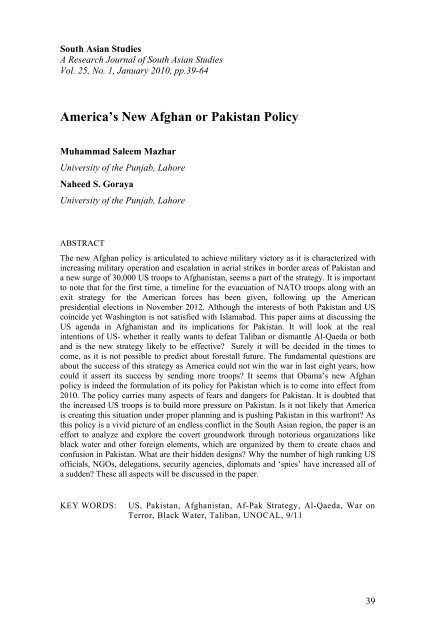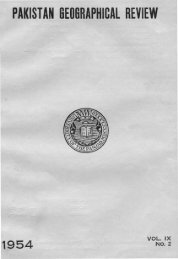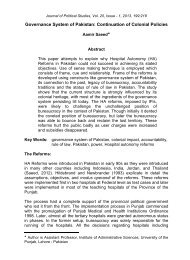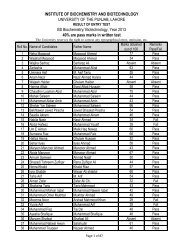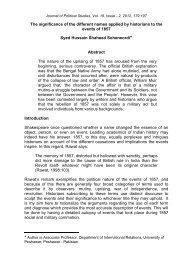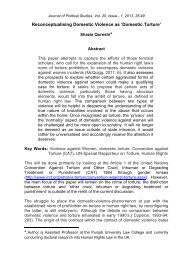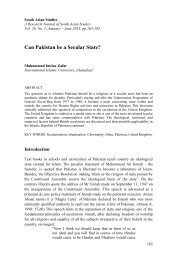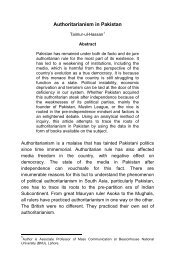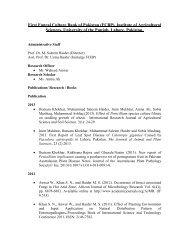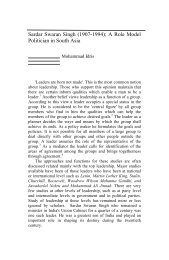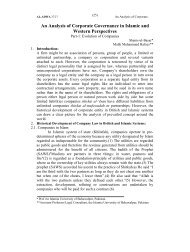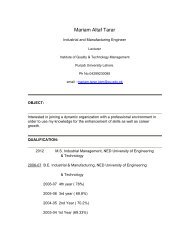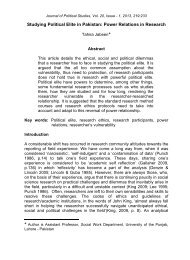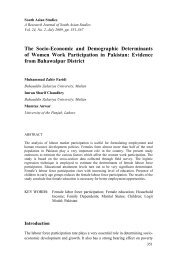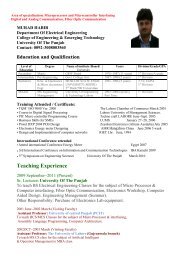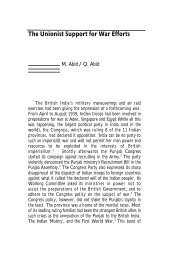America's New Afghan or Pakistan Policy - University of the Punjab
America's New Afghan or Pakistan Policy - University of the Punjab
America's New Afghan or Pakistan Policy - University of the Punjab
Create successful ePaper yourself
Turn your PDF publications into a flip-book with our unique Google optimized e-Paper software.
South Asian Studies<br />
A Research Journal <strong>of</strong> South Asian Studies<br />
Vol. 25, No. 1, January 2010, pp.39-64<br />
America’s <strong>New</strong> <strong>Afghan</strong> <strong>or</strong> <strong>Pakistan</strong> <strong>Policy</strong><br />
Muhammad Saleem Mazhar<br />
<strong>University</strong> <strong>of</strong> <strong>the</strong> <strong>Punjab</strong>, Lah<strong>or</strong>e<br />
Naheed S. G<strong>or</strong>aya<br />
<strong>University</strong> <strong>of</strong> <strong>the</strong> <strong>Punjab</strong>, Lah<strong>or</strong>e<br />
ABSTRACT<br />
The new <strong>Afghan</strong> policy is articulated to achieve military vict<strong>or</strong>y as it is characterized with<br />
increasing military operation and escalation in aerial strikes in b<strong>or</strong>der areas <strong>of</strong> <strong>Pakistan</strong> and<br />
a new surge <strong>of</strong> 30,000 US troops to <strong>Afghan</strong>istan, seems a part <strong>of</strong> <strong>the</strong> strategy. It is imp<strong>or</strong>tant<br />
to note that f<strong>or</strong> <strong>the</strong> first time, a timeline f<strong>or</strong> <strong>the</strong> evacuation <strong>of</strong> NATO troops along with an<br />
exit strategy f<strong>or</strong> <strong>the</strong> American f<strong>or</strong>ces has been given, following up <strong>the</strong> American<br />
presidential elections in November 2012. Although <strong>the</strong> interests <strong>of</strong> both <strong>Pakistan</strong> and US<br />
coincide yet Washington is not satisfied with Islamabad. This paper aims at discussing <strong>the</strong><br />
US agenda in <strong>Afghan</strong>istan and its implications f<strong>or</strong> <strong>Pakistan</strong>. It will look at <strong>the</strong> real<br />
intentions <strong>of</strong> US- whe<strong>the</strong>r it really wants to defeat Taliban <strong>or</strong> dismantle Al-Qaeda <strong>or</strong> both<br />
and is <strong>the</strong> new strategy likely to be effective? Surely it will be decided in <strong>the</strong> times to<br />
come, as it is not possible to predict about f<strong>or</strong>estall future. The fundamental questions are<br />
about <strong>the</strong> success <strong>of</strong> this strategy as America could not win <strong>the</strong> war in last eight years, how<br />
could it assert its success by sending m<strong>or</strong>e troops? It seems that Obama’s new <strong>Afghan</strong><br />
policy is indeed <strong>the</strong> f<strong>or</strong>mulation <strong>of</strong> its policy f<strong>or</strong> <strong>Pakistan</strong> which is to come into effect from<br />
2010. The policy carries many aspects <strong>of</strong> fears and dangers f<strong>or</strong> <strong>Pakistan</strong>. It is doubted that<br />
<strong>the</strong> increased US troops is to build m<strong>or</strong>e pressure on <strong>Pakistan</strong>. Is it not likely that America<br />
is creating this situation under proper planning and is pushing <strong>Pakistan</strong> in this warfront? As<br />
this policy is a vivid picture <strong>of</strong> an endless conflict in <strong>the</strong> South Asian region, <strong>the</strong> paper is an<br />
eff<strong>or</strong>t to analyze and expl<strong>or</strong>e <strong>the</strong> covert groundw<strong>or</strong>k through not<strong>or</strong>ious <strong>or</strong>ganizations like<br />
black water and o<strong>the</strong>r f<strong>or</strong>eign elements, which are <strong>or</strong>ganized by <strong>the</strong>m to create chaos and<br />
confusion in <strong>Pakistan</strong>. What are <strong>the</strong>ir hidden designs? Why <strong>the</strong> number <strong>of</strong> high ranking US<br />
<strong>of</strong>ficials, NGOs, delegations, security agencies, diplomats and ‘spies’ have increased all <strong>of</strong><br />
a sudden? These all aspects will be discussed in <strong>the</strong> paper.<br />
KEY WORDS: US, <strong>Pakistan</strong>, <strong>Afghan</strong>istan, Af-Pak Strategy, Al-Qaeda, War on<br />
Terr<strong>or</strong>, Black Water, Taliban, UNOCAL, 9/11<br />
39
South Asian Studies 25 (1)<br />
<strong>Afghan</strong> <strong>Policy</strong>- December 1, 2009<br />
Two months after becoming American president, Obama, on March 27, 2009,<br />
while speaking at West Point Military Academy announced “a Comprehensive<br />
<strong>New</strong> Strategy f<strong>or</strong> <strong>Afghan</strong>istan and <strong>Pakistan</strong>”, known as “Af-Pak Strategy” , in<br />
which, he said:<br />
“As President, my greatest responsibility is to protect <strong>the</strong><br />
American people… We are in <strong>Afghan</strong>istan to confront a<br />
common enemy that threatens <strong>the</strong> United States, our friends<br />
and allies, and <strong>the</strong> people <strong>of</strong> <strong>Afghan</strong>istan and <strong>Pakistan</strong> who<br />
have suffered <strong>the</strong> most at <strong>the</strong> hands <strong>of</strong> violent extremists. So I<br />
want <strong>the</strong> American people to understand that we have a clear<br />
and focused goal: to disrupt, dismantle and defeat in <strong>Pakistan</strong><br />
and <strong>Afghan</strong>istan, and to prevent <strong>the</strong>ir return to stronger,<br />
smarter and comprehensive strategy”<br />
(http://www.whitehouse.gov/<strong>the</strong>_press_<strong>of</strong>fice/Remarksby-<strong>the</strong>-President-on-a-<strong>New</strong>-Strategy-f<strong>or</strong>-<strong>Afghan</strong>istanand-<strong>Pakistan</strong>/).<br />
After his claim <strong>of</strong> ‘a careful policy review’, after passing eight months, on<br />
December 1, 2009, he announced a new policy f<strong>or</strong> <strong>Afghan</strong>istan. Gen James L.<br />
Jones, Obama’s National Security Advis<strong>or</strong>, declared: “We have strategic interests<br />
in South Asia that should not be measured in terms <strong>of</strong> finite times. We are going to<br />
be in <strong>the</strong> region f<strong>or</strong> a long time”.<br />
Obama has explained three key measures outlining his mission:<br />
1. A military surge within <strong>Afghan</strong>istan to defeat Taliban<br />
2. A civilian surge to build up <strong>the</strong> capacity <strong>of</strong> all-round governance in<br />
<strong>Afghan</strong>istan<br />
3. An effective partnership with <strong>Pakistan</strong><br />
(http://www.cbsnews.com/st<strong>or</strong>ies/2009/12/01/politics/main5855734.shtml).<br />
Though Obama‘s objectives are designed in military terms to deny a safe<br />
heaven f<strong>or</strong> , reverse <strong>the</strong> Taliban’s momentum and streng<strong>the</strong>ning <strong>the</strong> Kabul<br />
government’s security f<strong>or</strong>ces yet nothing was said about broader goals like<br />
spreading democracy, protecting human rights <strong>or</strong> assisting in women’s education.<br />
The nation he was interested in building, he explained, was America (<strong>New</strong>sweek,<br />
2009, December 4).<br />
Hist<strong>or</strong>y <strong>of</strong> great nations is replete with precedents when <strong>the</strong>y lost <strong>the</strong>ir way by<br />
getting caught up in imperial missions far from home that crippled <strong>the</strong>ir will, focus<br />
and strength (<strong>New</strong>sweek, 2009, December 4). American President Obama has<br />
played his last card on <strong>Afghan</strong>istan. He has conceded it to a surge but connected it<br />
with time frame <strong>of</strong> 18 months’ withdrawal. It seems a part <strong>of</strong> his re-election<br />
campaign but nothing is new in <strong>Afghan</strong> policy which may carry imp<strong>or</strong>tance. The<br />
war which America could not win in <strong>the</strong> last 8 years, how could it be won by<br />
40
M. Saleem Mazhar & Naheed S. G<strong>or</strong>aya America’s <strong>New</strong> <strong>Afghan</strong><br />
sending 30,000 m<strong>or</strong>e troops, particularly when analysts are giving <strong>the</strong>ir clear<br />
verdict <strong>of</strong> failure <strong>of</strong> US in <strong>Afghan</strong>istan? Many <strong>of</strong>ten American Generals have<br />
pleaded guilty about <strong>the</strong>ir failure. It can be assessed from Graham E. Fuller’s<br />
statement, a f<strong>or</strong>mer CIA Station Chief in Kabul and a f<strong>or</strong>mer Vice Chairman <strong>of</strong> <strong>the</strong><br />
CIA’s National Intelligence Council, that ‘US troops are regarded as an occupying<br />
f<strong>or</strong>ce, “an affront <strong>of</strong> <strong>Afghan</strong> nationalism”; <strong>the</strong> war is not winnable and should not<br />
have been started in <strong>the</strong> first instance and “Strategic Failure” was inherent in<br />
venture’ (Dawn, 2009, December 12). Obama administration has no better choice<br />
in <strong>Afghan</strong>istan because time has changed and now battles are not to be fought with<br />
military might and f<strong>or</strong>ce. In changing situation, triumph and success is likely to be<br />
achieved by c<strong>or</strong>rect strategies to be adopted at right time. Wars are won with<br />
commitments, passions and on <strong>the</strong> basis <strong>of</strong> ethical and m<strong>or</strong>al principals with high<br />
aims and objectives beyond <strong>the</strong> materialistic approach. Sending m<strong>or</strong>e troops mean,<br />
an increase in number <strong>of</strong> <strong>the</strong> Taliban and <strong>the</strong> <strong>Afghan</strong>s entering into <strong>Pakistan</strong>. It is<br />
merely a tactic to satisfy its depressed soldiers because by <strong>the</strong> time <strong>the</strong> troops<br />
reach <strong>Afghan</strong>istan, <strong>the</strong>ir exit will start. American claim to streng<strong>the</strong>n <strong>Afghan</strong><br />
National Army and police within a time span <strong>of</strong> 18 months is to live in a fool’s<br />
paradise. The people who could not establish <strong>Afghan</strong> army and <strong>the</strong> institution <strong>of</strong><br />
police in last 8 years, how would <strong>the</strong>y be able to f<strong>or</strong>mulate it with in a few months.<br />
Obama had described <strong>Afghan</strong>istan as a “war <strong>of</strong> necessity” and expected that “Over<br />
18 months our troops will begin to come home” (Ibid).<br />
Acc<strong>or</strong>ding to Craig Murray, a f<strong>or</strong>mer diplomat <strong>of</strong> Britain and human rights<br />
activist, “The purpose <strong>of</strong> war is to protect UNOCAL’s 1 interest. UNOCAL, an oil<br />
giant, wanted to carry gas from Turkmenistan across <strong>Afghan</strong>istan to <strong>Pakistan</strong>. This<br />
pipeline project could be constructed if all <strong>Afghan</strong> factions would accept and<br />
cooperate in it. There are designs <strong>of</strong> this pipeline, and <strong>the</strong> deployment <strong>of</strong> US f<strong>or</strong>ces<br />
in <strong>Afghan</strong>istan, as against o<strong>the</strong>r NATO 2 country f<strong>or</strong>ces in <strong>Afghan</strong>istan, will<br />
undoubtedly be in a position to guard <strong>the</strong> pipeline route. ‘It’s what it’s about. It’s<br />
about money, it’s about oil, it is not about democracy. The Trans-<strong>Afghan</strong>istan<br />
Pipeline is slated to be completed in 2014, with $7.6 billion in funding from <strong>the</strong><br />
Asian Development Bank’ (http://centurean2.w<strong>or</strong>dpress.com/2009/12/12/transafghanistan-pipeline-unicol-and-karzai_-f<strong>or</strong>mer-uk-ambassad<strong>or</strong>-cia-sent-peopleto-be-%E2%80%98raped-with-broken-bottles%E2%80%99/).<br />
Murray fur<strong>the</strong>r says<br />
that Obama's claim that "Our cause is just" ultimately rests on <strong>the</strong> extra<strong>or</strong>dinary<br />
claim that, eight years after <strong>the</strong> invasion, we are still <strong>the</strong>re in self-defence. In both<br />
<strong>the</strong> UK and US, governments are relying on <strong>the</strong> mantra that <strong>the</strong> occupation <strong>of</strong><br />
<strong>Afghan</strong>istan protects us from terr<strong>or</strong>ism at home. Our cause is unjust. We are<br />
responsible f<strong>or</strong> <strong>the</strong> deaths <strong>of</strong> tens <strong>of</strong> thousands <strong>of</strong> civilians in <strong>Afghan</strong>istan and<br />
<strong>Pakistan</strong>, and f<strong>or</strong> <strong>the</strong> fur<strong>the</strong>r <strong>of</strong> radicalisation <strong>of</strong> Muslim communities w<strong>or</strong>ldwide.<br />
That threatens a perpetual war - which is <strong>of</strong> course just what <strong>the</strong> military-industrial<br />
complex and <strong>the</strong> security industry want. They have captured Obama.<br />
(http://www.craigmurray.<strong>or</strong>g.uk/archives/2009/12/obama_is_wrong.html).<br />
41
South Asian Studies 25 (1)<br />
Iraq and <strong>Afghan</strong> Wars’ Cost to <strong>the</strong> US<br />
The war in Iraq was a choice and in <strong>Afghan</strong>istan a necessity (Dawn, 2009,<br />
September 15). The war in <strong>Afghan</strong>istan is costing m<strong>or</strong>e loss as compared to <strong>the</strong><br />
advantages. Acc<strong>or</strong>ding to Robert Murray, “The easiest way now f<strong>or</strong> <strong>the</strong> Americans<br />
is to buy this American-based oil company Unocal, company and hand over it to<br />
<strong>Afghan</strong>is.” America has so far spent 1 trillion dollar on Iraq and <strong>Afghan</strong> wars and<br />
now $ 30 billion are being spent annually. <strong>New</strong>sweek has p<strong>or</strong>trayed a very<br />
pa<strong>the</strong>tic picture <strong>of</strong> <strong>the</strong> sole Super Power. It has published an article, “How Great<br />
Powers Fall” by Niall Ferguson. Beneath this heading, an over turned picture <strong>of</strong><br />
White House is given and below that it is written, “Steep debt, slow growth, and<br />
high spending kill empires-and America could be next.”<br />
42<br />
Picture 1<br />
Source: <strong>New</strong>sweek December 07, 2009<br />
M<strong>or</strong>e than 95 banks <strong>of</strong> America have been closed and 3 million employments have<br />
been finished. One million dollar annually is being spent on one American soldier.<br />
(Daily Jang, 2010, February 4). Acc<strong>or</strong>ding to <strong>the</strong> US Army Medical<br />
Department's 2008 mental-health rep<strong>or</strong>t, at least 13% <strong>of</strong> US troops in Iraq and 17<br />
% <strong>of</strong> US troops in <strong>Afghan</strong>istan are taking antidepressants, anxiety medication, <strong>or</strong><br />
sleeping pills. (http://<strong>the</strong>phoenix.com/boston/news/78044-soldiers-committingsuicide/).<br />
This rep<strong>or</strong>t presented a h<strong>or</strong>rible picture <strong>of</strong> depression among American<br />
soldiers. The monthly expenses on war in <strong>Afghan</strong>istan are $ 3.6 billion and it is<br />
like a whip on American economy. A few questions are very much pertinent to be<br />
answered. When Russia left <strong>Afghan</strong>istan and <strong>the</strong>re were signs <strong>of</strong> <strong>the</strong> establishment<br />
<strong>of</strong> an Islamic state in <strong>Afghan</strong>istan, who was <strong>the</strong> real player behind <strong>the</strong> scene who<br />
made <strong>the</strong> <strong>Afghan</strong> inhabitants fight with one ano<strong>the</strong>r. It was America which knew<br />
that if <strong>Afghan</strong>istan, Iran and Turkmenistan became united as Islamic states, <strong>the</strong>y
M. Saleem Mazhar & Naheed S. G<strong>or</strong>aya America’s <strong>New</strong> <strong>Afghan</strong><br />
would rise to a big power and resultantly, this unification will have effect on <strong>the</strong><br />
policies <strong>of</strong> Middle East. This situation would have created dangers f<strong>or</strong> Israel and<br />
this was <strong>the</strong> c<strong>or</strong>e reasons behind <strong>the</strong> bitter truth that America did never let<br />
establish a stable government in <strong>Afghan</strong>istan. America wants to reach <strong>the</strong> rich<br />
Central Asian States (CARs) 3 , having an access through <strong>Afghan</strong>istan. Many years<br />
bef<strong>or</strong>e 9/11, on June 23rd, 1998, Dick Cheney who was <strong>the</strong> <strong>the</strong>n Chief Executive<br />
<strong>of</strong> Halliburton 4 , <strong>the</strong> w<strong>or</strong>ld’s second largest oil services company, said while<br />
discussing <strong>the</strong> imp<strong>or</strong>tance <strong>of</strong> Oil Reserves in Caspian Basin, in a seminar<br />
<strong>or</strong>ganized by Cato 5 Institute, libertarian think tank headquartered in Washington,<br />
D.C.,<br />
“[We] <strong>of</strong>tentimes find ourselves operating in some very difficult places. The<br />
good L<strong>or</strong>d didn’t see fit to put oil and gas only where <strong>the</strong>re are democratically<br />
elected regimes friendly to <strong>the</strong> United States. Occasionally we have to operate in<br />
places where, all things considered, one would not n<strong>or</strong>mally choose to go. But, we<br />
go where <strong>the</strong> business is”. While emphasizing <strong>the</strong> imp<strong>or</strong>tance <strong>of</strong> <strong>the</strong> Caspian<br />
Basin, he fur<strong>the</strong>r added that:<br />
“I can’t think <strong>of</strong> a time when we’ve had a region emerge as<br />
suddenly to become as strategically significant as <strong>the</strong> Caspian.<br />
It’s almost as if <strong>the</strong> opp<strong>or</strong>tunities have arisen overnight”<br />
(http://www.hist<strong>or</strong>ycommons.<strong>or</strong>g/context.jsp?item=a062398ch<br />
eney&scale=2#a062398cheney).<br />
Dick Cheney had also pointed out <strong>the</strong> Caspian Region as an alternative route<br />
f<strong>or</strong> oil and gas due to instability in <strong>the</strong> Gulf. Bef<strong>or</strong>e 9/11, a delegation <strong>of</strong> <strong>Afghan</strong><br />
government (Taliban) visited US to have a dialogue with American government on<br />
<strong>the</strong> extraction <strong>of</strong> oil. But <strong>the</strong>se dialogues were failed on <strong>the</strong> distribution <strong>of</strong> royalty.<br />
All this has also been shown in a Hollywood movie, Fahrenheit 9/11 6 by Michael<br />
Mo<strong>or</strong>e. Acc<strong>or</strong>ding to a rep<strong>or</strong>t <strong>of</strong> BBC, published on December 04, 1997, and is<br />
available on its website with <strong>the</strong> title <strong>of</strong> “Taliban in Texas f<strong>or</strong> Talks on Gas<br />
Pipeline” which indicates, “A seni<strong>or</strong> delegation from <strong>the</strong> Taliban movement in<br />
<strong>Afghan</strong>istan is in <strong>the</strong> United States f<strong>or</strong> talks with an International Energy<br />
Company that wants to construct a gas pipeline from Turkmenistan across<br />
<strong>Afghan</strong>istan to <strong>Pakistan</strong>. A spokesman <strong>of</strong> UNOCAL said that Taliban were<br />
expecting to spend several days at <strong>the</strong> company's headquarters in Sugarland and<br />
Texas. UNOCAL has agreements with Turkmenistan to sell its gas and with<br />
<strong>Pakistan</strong> to buy it. But, despite <strong>the</strong> civil war in <strong>Afghan</strong>istan, UNOCAL has been in<br />
competition with an Argentinean firm, Bridas 7 , which is a large independent oil<br />
and gas company <strong>of</strong> Latin America and was <strong>the</strong> first Western company that started<br />
<strong>the</strong> task <strong>of</strong> expl<strong>or</strong>ation <strong>of</strong> Ireland gas in Turkmenistan.<br />
(http://search.bbc.co.uk/search?go=homepage&scope=all&q=Taliban+in+Texas+f<br />
<strong>or</strong>+talks+on+gas+pipeline).<br />
In <strong>the</strong> w<strong>or</strong>ds <strong>of</strong> General Stanley McChrystal, Commander <strong>of</strong> NATO f<strong>or</strong>ces in<br />
<strong>Afghan</strong>istan, “I think all wars must end in a political settlement. And I believe that<br />
43
South Asian Studies 25 (1)<br />
this must be an <strong>Afghan</strong> political settlement that <strong>Afghan</strong>s feel comf<strong>or</strong>table about”<br />
(http://www.pbs.<strong>or</strong>g/newshour/bb/asia/jan-june10/mcchrystal2_05-13.html).<br />
There have been rep<strong>or</strong>ts that:<br />
44<br />
� ���� ���<br />
���<br />
�� � ���� ��� ���<br />
�� ��<br />
��� ���<br />
���<br />
��� ���� �<br />
�� ��<br />
��<br />
�� ��<br />
���<br />
��<br />
�� �� � ��<br />
��<br />
� ����� ���<br />
���<br />
��<br />
��� � �� �� 2009��25����� ��<br />
������ �� ����� ����<br />
���<br />
��<br />
������<br />
���<br />
����<br />
�� ��<br />
�� ����<br />
�� ��<br />
��� ��<br />
���� ���<br />
��<br />
����� �� �<br />
� ��<br />
��� 8��� ��<br />
����<br />
��<br />
���<br />
���� ���<br />
��<br />
�� ��<br />
���<br />
���<br />
� �� ���<br />
���� ���<br />
�� ����� ��<br />
���<br />
�� ��<br />
�� �<br />
��<br />
������ �� ����<br />
��� � ��<br />
���� ��<br />
�� ��<br />
�� ����<br />
��<br />
���� ���<br />
�� � �� ���<br />
�� ����� ���<br />
��� � ��<br />
��� ��<br />
�� ��<br />
��<br />
���� ��<br />
��<br />
��<br />
� ������� ��� �� � ☺�� ���<br />
� ��� ��� �⌦� ��<br />
��<br />
��<br />
���<br />
���<br />
���<br />
�<br />
���<br />
���<br />
�� ��<br />
���<br />
�� ��<br />
�� �� � �� ��<br />
����<br />
��<br />
��<br />
� ���� ��<br />
��� � ��<br />
� �� ���<br />
☯� �� ��<br />
�� �� ��� ��<br />
��<br />
��<br />
Those arms weapons which have been overtaken from <strong>the</strong> extremists, fighting<br />
against <strong>Pakistan</strong> Army, are <strong>the</strong> same which American army is using against and<br />
<strong>the</strong> Taliban in <strong>Afghan</strong>istan. The definite w<strong>or</strong>rying point at issue is that after <strong>the</strong><br />
meeting <strong>of</strong> <strong>Pakistan</strong>i President and Indian Prime Minister, who said in a joint press<br />
note, released on November 25, 2009 that both countries will practically cooperate<br />
in demolishing <strong>the</strong> safe sanctuaries <strong>of</strong> terr<strong>or</strong>ists in <strong>Pakistan</strong>. All this is<br />
alarming f<strong>or</strong> <strong>Pakistan</strong>. We have been saying continuously f<strong>or</strong> last 8 years that<br />
America is fighting this war to gain control over oil and gas enriched Central<br />
Asian States, which will possibly cross through <strong>Afghan</strong>istan and <strong>Pakistan</strong>i<br />
Province, Balochistan. We have been saying since many years on different TV<br />
channels that America wants to sustain its armed control over <strong>Afghan</strong>istan by<br />
dropping Taliban regime. But it will not eliminate <strong>the</strong> power <strong>of</strong> Taliban because if<br />
<strong>the</strong> threat <strong>of</strong> Taliban diminishes, <strong>the</strong>n <strong>the</strong> local friends <strong>of</strong> America in <strong>Afghan</strong>istan<br />
will ask her to leave (Daily Jang, 2009, December 8).<br />
Comparing <strong>Afghan</strong>istan & Vietnam in Relation to US Military<br />
Intervention<br />
America is reiterating <strong>the</strong> tragedy <strong>of</strong> Vietnam in <strong>Afghan</strong>istan. When American<br />
Generals felt that <strong>the</strong>y were facing defeat, <strong>the</strong>y found its justification. US<br />
Administration first <strong>of</strong> all, declared that <strong>the</strong> army <strong>of</strong> N<strong>or</strong>th Vietnam is entering
M. Saleem Mazhar & Naheed S. G<strong>or</strong>aya America’s <strong>New</strong> <strong>Afghan</strong><br />
through Cambodia and <strong>the</strong>n it made covert attacks on Cambodia and finally an<br />
overt one. Today American administration is denying that <strong>the</strong>re is no similarity<br />
between Vietnam and <strong>Afghan</strong>istan on <strong>the</strong> basis <strong>of</strong> following points:<br />
� Unlike <strong>Afghan</strong>istan, no attack was made on Americans from Vietnam;<br />
� Unlike Vietnam, <strong>the</strong>re is no direct resistance movement within<br />
<strong>Afghan</strong>istan;<br />
� Unlike <strong>Afghan</strong>istan, no allied f<strong>or</strong>ces were w<strong>or</strong>king in Vietnam.<br />
These points highlight <strong>the</strong> differences but Obama has not thought over those<br />
points which are similar in both cases. America was fighting a war in Vietnam<br />
which was becoming obscure with every passing day. The contemp<strong>or</strong>ary hist<strong>or</strong>y<br />
reveals that both situations are same indeed. Obama has f<strong>or</strong>gotten that:<br />
� The American Commanders had demanded to send m<strong>or</strong>e troops in<br />
Vietnam to lie at stake but even <strong>the</strong>n American f<strong>or</strong>ces could not win.<br />
� ���<br />
�� ��<br />
� �� �5<br />
� ����⌧ �� ��<br />
�� ���<br />
�� �� � ���� ����� �� ��<br />
�� �� Haiphong ���Hanoi<br />
� ���� �� ���<br />
�� �� ��<br />
� ����� ��<br />
��� ��<br />
��� �<br />
America sent half million soldiers in South Vietnam. This army continued<br />
bombing on Hanoi and Haiphong in N<strong>or</strong>th and this war reached Cambodia while<br />
making eff<strong>or</strong>ts to eliminate <strong>the</strong> safe vict<strong>or</strong>y <strong>of</strong> Vietnamese warri<strong>or</strong>s and f<strong>or</strong> cutting<br />
<strong>the</strong>ir supply lines (Daily Jang, 2009, December 18).<br />
� America had been training its stooge dictat<strong>or</strong> and <strong>the</strong> army <strong>of</strong> South<br />
Vietnam, in Vietnam also. The same war <strong>of</strong> Vietnam was ultimately<br />
extended into Cambodia, a friend <strong>of</strong> America. After facing a humiliating<br />
defeat, America left Vietnam but by <strong>the</strong>n, Cambodia had been completely<br />
demolished even to date. Its economy was down-trodden<br />
��� � ����� ��<br />
��� �� ����<br />
��� 6000��� �� ��⌧ ���<br />
��� ��<br />
��� � ���� ��<br />
������� ���� ☺� � ���<br />
In Vietnam, m<strong>or</strong>e than 6000 American soldiers were killed and millions<br />
wounded are spending life <strong>of</strong> Indolent and Disables (Ibid).<br />
America has spent billions <strong>of</strong> dollars on this war. Obama is at “Lyndon<br />
Moment”. Lyndon B. Johnson, 36th President <strong>of</strong> US chose to stay and fight in<br />
Vietnam and faced humiliated defeat. As <strong>the</strong> wars are won by adopting right<br />
strategy at <strong>the</strong> right time and this is <strong>the</strong> point where US has failed. Obama’s<br />
<strong>Afghan</strong> policy may prove to be watershed event in <strong>the</strong> US contemp<strong>or</strong>ary hist<strong>or</strong>y,<br />
which may redefine its relations with <strong>the</strong> o<strong>the</strong>r countries in future (Dawn, 2009,<br />
December 12). An article entitled, “US could shift <strong>Afghan</strong>istan focus towards<br />
45
South Asian Studies 25 (1)<br />
Eastern provinces” published in Guardian, which states that, “The primary focus<br />
<strong>of</strong> US war strategy in <strong>Afghan</strong>istan could shift towards <strong>the</strong> Eastern provinces<br />
b<strong>or</strong>dering <strong>Pakistan</strong> and away from <strong>the</strong> South <strong>of</strong> <strong>the</strong> country where British f<strong>or</strong>ces<br />
are heavily engaged under a plan being finalized by commanders. The additional<br />
US military pressure along <strong>the</strong> Eastern b<strong>or</strong>der would cause concern in <strong>Pakistan</strong>,<br />
where US aerial drone attacks on and Taliban targets in Waziristan and <strong>the</strong><br />
<strong>Pakistan</strong>’s army’s US-driven spring <strong>of</strong>fensive against <strong>Pakistan</strong>i Taliban in Swat<br />
are blamed f<strong>or</strong> growing instability”<br />
(http://www.guardian.co.uk/w<strong>or</strong>ld/2009/sep/13/us-military-policy-fghanistan).<br />
A British Officer has rightly observed that <strong>the</strong> <strong>Afghan</strong>s are never at peace<br />
<strong>the</strong>mselves, except when <strong>the</strong>y are at war (Ahmar, 2006: 3). Eugene Robinson has<br />
written in an article that, “It never made sense to think <strong>of</strong> <strong>the</strong> fight against<br />
terr<strong>or</strong>ism as a "war" because it's not possible to defeat a technique <strong>or</strong> an idea by<br />
f<strong>or</strong>ce <strong>of</strong> arms. Ge<strong>or</strong>ge W. Bush chose a path towards a m<strong>or</strong>e <strong>or</strong> less permanent<br />
state <strong>of</strong> costly, deadly, low-level war. Barack Obama should have taken a different<br />
course” (The Washington Post, 2009, December 4).<br />
Impact on <strong>Pakistan</strong><br />
Admiral Mike Mullen, Chairman <strong>of</strong> <strong>the</strong> Joint Chiefs <strong>of</strong> Staff, has himself<br />
acknowledged <strong>the</strong> rep<strong>or</strong>ts <strong>of</strong> U.S. intelligence and all independent observers that<br />
Al-Qaeda is in <strong>Pakistan</strong>, as is <strong>the</strong> leadership <strong>of</strong> <strong>the</strong> hard-c<strong>or</strong>e <strong>Afghan</strong> Taliban<br />
(That's why it's called <strong>the</strong> Quetta Shura, Quetta being a <strong>Pakistan</strong>i city). All attacks<br />
against Western targets that have emanated from <strong>the</strong> region in <strong>the</strong> past eight years,<br />
have emanated from <strong>Pakistan</strong> and not from <strong>Afghan</strong>istan. Even <strong>the</strong> most recently<br />
foiled plot in <strong>the</strong> United States, which involved <strong>the</strong> first <strong>Afghan</strong> but he had <strong>or</strong>igin<br />
in <strong>Pakistan</strong>. Yet <strong>the</strong> US spends $30 in <strong>Afghan</strong>istan f<strong>or</strong> every dollar in <strong>Pakistan</strong><br />
(The Washington Post, 2009, October 12). Leaks suggest that Obama “signed <strong>of</strong>f”<br />
on a plan by CIA to expand its activities in <strong>Pakistan</strong> “that calls f<strong>or</strong> m<strong>or</strong>e strikes<br />
against militants by drone attacks (and)… sending additional spies to <strong>Pakistan</strong>”<br />
(The <strong>New</strong>s, December 15, 2009). <strong>Pakistan</strong> has suffered <strong>the</strong> loss <strong>of</strong> $ 35 billion and<br />
acc<strong>or</strong>ding to some estimates $ 40 billion in this 8 years’ war (Daily Jang, 2010,<br />
January 8). <strong>Afghan</strong> <strong>Policy</strong> <strong>of</strong> America is in fact <strong>the</strong> announcement <strong>of</strong> that<br />
<strong>Pakistan</strong>’s policy which is to come into effect in 2010. It is fraught with dangers<br />
and fears f<strong>or</strong> <strong>Pakistan</strong>. Few people think that American army is being increased f<strong>or</strong><br />
exerting pressure on <strong>Pakistan</strong>. American Commandoes have started saying that<br />
‘<strong>Afghan</strong> Shura’ in Balochistan shall be attacked through drones. The sovereignty<br />
<strong>of</strong> <strong>Pakistan</strong> will be challenged in both ways, be it surgical strikes <strong>or</strong> drone attacks.<br />
The Guardian has rep<strong>or</strong>ted that, “Fighting along <strong>the</strong> <strong>Pakistan</strong>i side <strong>of</strong> <strong>the</strong> b<strong>or</strong>der<br />
appears to be spreading” (Guardian, 2009, September 13).<br />
46
M. Saleem Mazhar & Naheed S. G<strong>or</strong>aya America’s <strong>New</strong> <strong>Afghan</strong><br />
In <strong>the</strong> beginning, <strong>the</strong> strategy was known as Af-Pak strategy, both countries<br />
might be treated separately but with one challenge. This term was rejected by<br />
<strong>Pakistan</strong>i President, Asif Ali Zardari. In an interview with Financial Times, Mr.<br />
Zardari said that, “<strong>Afghan</strong>istan and <strong>Pakistan</strong> are distinctively different countries<br />
and can not be lumped toge<strong>the</strong>r f<strong>or</strong> any reason” (Financial Times, 2009,<br />
September 10). If we review <strong>the</strong> situation, it becomes clear that <strong>the</strong> situation <strong>of</strong><br />
<strong>Pakistan</strong> is w<strong>or</strong>se than <strong>Afghan</strong>istan. As <strong>the</strong> new strategy unfolds, <strong>Pakistan</strong> would<br />
be in a middle <strong>of</strong> things to come. On April 6, 2009, Admiral Mike Mullen said in a<br />
dinner given by <strong>the</strong> US ambassad<strong>or</strong> to <strong>Pakistan</strong>, Anne W. Patterson that, “<strong>the</strong><br />
focus <strong>of</strong> new <strong>Afghan</strong> policy is “<strong>Pakistan</strong>.”, as so far <strong>Pakistan</strong> has suffered m<strong>or</strong>e”<br />
(Daily Express, 2009, April 7).<br />
The implications f<strong>or</strong> <strong>Pakistan</strong> <strong>of</strong> fur<strong>the</strong>r military escalation are absolute and<br />
unquestionably w<strong>or</strong>sening. <strong>Pakistan</strong>i b<strong>or</strong>der areas have been declared <strong>the</strong><br />
epicenters <strong>of</strong> terr<strong>or</strong>ist activities by US which will lead to an insurgency in <strong>the</strong><br />
people <strong>of</strong> those areas. Intensified fighting in <strong>Afghan</strong>istan, far from diminishing <strong>the</strong><br />
threat <strong>of</strong> m<strong>or</strong>e instability in <strong>Pakistan</strong>-being marshaled out as a spurious rationale<br />
by <strong>the</strong> US <strong>of</strong>ficials in a curious version <strong>of</strong> <strong>the</strong> old domino <strong>the</strong><strong>or</strong>y. It will enhance it<br />
(The <strong>New</strong>s, 2009, December 7). Gen (r) James Jones, who had personally brought<br />
Obama’s letter f<strong>or</strong> Mr. Zardari, carrying <strong>the</strong> demand that ei<strong>the</strong>r <strong>Pakistan</strong> should<br />
take action against <strong>the</strong> centers <strong>of</strong> terr<strong>or</strong>ists <strong>or</strong> o<strong>the</strong>rwise US will take <strong>the</strong> step.<br />
Whatever <strong>the</strong> policy might have repercussions f<strong>or</strong> <strong>Afghan</strong>istan, <strong>Pakistan</strong> will<br />
definitely have severe effect. Acc<strong>or</strong>ding to an estimate, <strong>Pakistan</strong> has lost almost<br />
80,000 civilians and 2,900 soldiers in terr<strong>or</strong>ism related violence between 2003 and<br />
2009. As an increase in American troops will not only lead to m<strong>or</strong>e violence in<br />
<strong>Afghan</strong>istan but resultantly this militancy will penetrate into <strong>Pakistan</strong>. This new<br />
surge will be appointed along with Lake Halmand to Kunner and <strong>the</strong> areas <strong>of</strong><br />
NWFP 8 , FATA 9 and Balochistan will directly come under its effect. Acc<strong>or</strong>ding to<br />
US, <strong>the</strong> leadership <strong>of</strong> Al-Qaeda lies hidden in Balochistan and thus drone attacks<br />
are being considered <strong>the</strong> need <strong>of</strong> <strong>the</strong> hour. Shamsi Airbase 10 , called Bandari (a<br />
small Air F<strong>or</strong>ce's airfield and air station located in Balochistan, <strong>Pakistan</strong>), about<br />
200 miles (320 km) southwest <strong>of</strong> Quetta near <strong>the</strong> town <strong>of</strong> Washki and Jackobabad<br />
Airp<strong>or</strong>t (Jackobabad, Sindh) are already under US occupation.<br />
The demand <strong>of</strong> ‘Do M<strong>or</strong>e,’ drone attacks on <strong>Pakistan</strong>i land by US and <strong>the</strong><br />
killing <strong>of</strong> innocent civilians will compound as flimsy security situation. The<br />
expansion in drone attacks is fraught with perils. Today America is doing this and<br />
tom<strong>or</strong>row, Iran will demand to make actions against Jandullah in Balochistan and<br />
<strong>the</strong>n India will ask to trial Lashkar-e-Tayebba. Americans are training <strong>Pakistan</strong>i<br />
police in Sihala, Rawalpindi (<strong>Punjab</strong>) and <strong>the</strong> way American embassy in<br />
Islamabad is being extended, it seems that it shall be converted into mini-<br />
Pentagon. Richard Halbrooke’s talk with Fareed Zakaria was aired on December<br />
06, 2009 on CNN 11 , in which he said that, “The goals are m<strong>or</strong>e counterterr<strong>or</strong>ism<br />
than counterinsurgency, m<strong>or</strong>e military than broadly political. The thing that<br />
47
South Asian Studies 25 (1)<br />
<strong>Pakistan</strong> needs, is to completely redefine its interests -- not be focused on India,<br />
but in fact, be focused on what <strong>the</strong> US president obama called <strong>the</strong> cancer within its<br />
society, <strong>the</strong> rising jihadist insurgency <strong>the</strong>re, and not be focused on controlling <strong>the</strong><br />
political space in <strong>Afghan</strong>istan as strategic depth against India, and <strong>the</strong>ref<strong>or</strong>e is a<br />
place to have its own Taliban to manage that.<br />
(http://transcripts.cnn.com/TRANSCRIPTS/0912/06/fzgps.01.html).<br />
It looks that <strong>the</strong>re are some hidden f<strong>or</strong>ces and conspiracies which are trying<br />
<strong>the</strong>ir utmost to prove this war as <strong>Pakistan</strong>’s. Technology is being provided to<br />
militants but <strong>the</strong> question is why? What are <strong>the</strong>ir motives? Why <strong>the</strong>y want to<br />
destabilize <strong>Pakistan</strong>. N<strong>or</strong>th Carolina-based Black Water (now called Xe-<br />
Services 12 ) has emerged in <strong>the</strong> recent months. It has been rep<strong>or</strong>ted that <strong>the</strong> agency<br />
has been hired as a part <strong>of</strong> <strong>the</strong> programme to assassinate leaders <strong>of</strong> and to assist in<br />
CIA’s predat<strong>or</strong> drone programme in <strong>Afghan</strong>istan and <strong>Pakistan</strong> (The Nation, 2009,<br />
December 11). Acc<strong>or</strong>ding to Jeremy Scahill’s rep<strong>or</strong>t in <strong>the</strong> Nation, <strong>the</strong>se special<br />
Blackwater cells also had bases in Karachi and o<strong>the</strong>r parts <strong>of</strong> <strong>Pakistan</strong>, from which<br />
<strong>the</strong>y ran <strong>the</strong>ir operations. He writes that, On Thursday (January 20, 2010), US<br />
Defence Secretary Robert Gates confirmed that Blackwater is operating in<br />
<strong>Pakistan</strong>” (The Nation, 2010, January 22).<br />
America entered in <strong>Afghan</strong>istan after 9/11 and today <strong>the</strong> vehicles <strong>of</strong> American<br />
commandoes and diplomats can be seen from Karachi (city <strong>of</strong> Sindh to Dera Ghazi<br />
Khan, a city <strong>of</strong> <strong>Punjab</strong>, <strong>Pakistan</strong>). Those people can speak Pashto and Arabic.<br />
There have been rep<strong>or</strong>ts that many Americans are residing in Islamabad.<br />
��<br />
�� �� �� ��<br />
�� � ��<br />
�� ����<br />
���<br />
�� ��<br />
�<br />
��� ����<br />
� �<br />
��� ��<br />
��<br />
�� ��<br />
�⌦�� ��<br />
� ���<br />
�<br />
A European Embassy has taken permission f<strong>or</strong> Anti-gunship by <strong>the</strong> government <strong>of</strong><br />
<strong>Pakistan</strong>. Heavy arms were recovered from <strong>the</strong> embassy’s vehicles. It was found<br />
through investigation that <strong>the</strong> number plates <strong>of</strong> vehicles were fake (Daily Express,<br />
2009, December 6).<br />
On one hand, America takes <strong>Pakistan</strong> as an ally but on <strong>the</strong> o<strong>the</strong>r hand, <strong>the</strong><br />
American detective <strong>or</strong>ganizations through <strong>the</strong>ir detective contract<strong>or</strong>s are trying to<br />
create a situation like Iraq and <strong>Afghan</strong>istan in <strong>Pakistan</strong>, by getting concessions<br />
through <strong>Pakistan</strong>i diplomatic agencies. It has been rep<strong>or</strong>ted that <strong>the</strong> <strong>of</strong>ficers <strong>of</strong><br />
American consulate in Karachi have been wandering in different areas <strong>of</strong> Sukkur<br />
(Sindh) without any security inf<strong>or</strong>mation and permission from <strong>the</strong> relevant<br />
quarters (Daily Jang, 2009, November, 15, 16).<br />
The failure framew<strong>or</strong>k <strong>of</strong> “war on terr<strong>or</strong>” illustrates one <strong>of</strong> <strong>the</strong> enduring<br />
lessons <strong>of</strong> <strong>the</strong> modern interwar years that <strong>the</strong> search f<strong>or</strong> a replacement f<strong>or</strong> <strong>the</strong> Cold<br />
War’s doctrine <strong>of</strong> containment proved not only elusive, ra<strong>the</strong>r due to its<br />
48<br />
����<br />
���� � ���<br />
��<br />
���<br />
���� �� �⌧<br />
���
M. Saleem Mazhar & Naheed S. G<strong>or</strong>aya America’s <strong>New</strong> <strong>Afghan</strong><br />
oversimplifications, dangerous too. Since <strong>the</strong> end <strong>of</strong> <strong>the</strong> Cold War, American<br />
policy makers and scholars have lab<strong>or</strong>ed in vain to define <strong>the</strong> era and characterize<br />
<strong>the</strong> country’s new purpose in a simple phrase. From Francis Fukuyama’s “End <strong>of</strong><br />
Hist<strong>or</strong>y” and Ge<strong>or</strong>ge H. W. Bush’s “<strong>New</strong> W<strong>or</strong>ld Order,” to Tony Lake’s<br />
“Democratic Enlargement” and Clinton’s quest f<strong>or</strong> a Globalization Slogan, no<br />
single expression illuminated America’s purpose after <strong>the</strong> Cold War. And it was<br />
folly to believe one could (Chollet and Gldgeier, 2008: 315).<br />
Acc<strong>or</strong>ding to a rep<strong>or</strong>t,<br />
� �� ��18��<br />
� �� ��38��<br />
�� ��<br />
��� ��<br />
�⌧���� ���<br />
�� ��<br />
��� ��<br />
���<br />
��56<br />
���<br />
���<br />
�����<br />
�� �� ��� 111 ���� �� � ��� � 405 ���<br />
����<br />
� CDA<br />
� 945<br />
�� �� ��� ��<br />
������ �330�<br />
� ���<br />
�����<br />
��<br />
Complex<br />
�� �� 350� ��<br />
�� �� ��<br />
� ��⌧�� � ���<br />
��750<br />
�� �� �� ����� Mini��� �� ��<br />
�� � ���� �� �� ����<br />
��<br />
�<br />
���� ��� ��<br />
�� ���<br />
��<br />
� ��� �� � ��������� CIA�<br />
��<br />
��<br />
�� ���� �� �� ���<br />
��� ��<br />
�� �����<br />
��� � �� � �� �200���<br />
�� �⌧���� ���� ��<br />
�� ��<br />
��<br />
��� ��<br />
�� ������<br />
� ����� �� �<br />
� ����<br />
����� ��<br />
����� ��� ��� � ������ ��<br />
����<br />
�������� � ������ �� ��� ���<br />
�� ��<br />
� �� �1500��<br />
�� ��<br />
��� ��<br />
�� ��<br />
��� � ��� ����<br />
��� �<br />
������<br />
American Embassy in Islamabad consists <strong>of</strong> an area <strong>of</strong> 38 acres. The embassy will<br />
surround an area <strong>of</strong> 56 acres, after buying <strong>the</strong> costly land <strong>of</strong> 18 acres. 945 millions<br />
will be spent on its construction. 405 million on central building and 111 million $<br />
will be spent on <strong>the</strong> construction <strong>of</strong> a complex, in which 330 people can be<br />
accomodated. Currently, 750 people are w<strong>or</strong>king in <strong>the</strong> embassy while only 350<br />
people are allowed to w<strong>or</strong>k. After <strong>the</strong> construction is completed, 1000 marines will<br />
be sent. Hundreds <strong>of</strong> American commandos have come to secure this Miny-<br />
Pantagon, CIA Headquarter <strong>or</strong> American Military Station. It is <strong>the</strong> ever biggest US<br />
embassy in any country across <strong>the</strong> globe. Besides, <strong>the</strong> extension <strong>of</strong> <strong>the</strong> embassy,<br />
US has ei<strong>the</strong>r rented out 200 houses <strong>or</strong> bought in Islamabad. Also a big peace <strong>of</strong><br />
land has also been bought near Tarbela, various Banglows and land have been<br />
rented out in <strong>the</strong> <strong>University</strong> Town, Chinnar Road, Hayatabad and Shamiabad in<br />
49
South Asian Studies 25 (1)<br />
Peshawar. America is buying 1500 acres in Petaro, a small town near Hyderabad<br />
in Jamsh<strong>or</strong>o district, Sindh (Daily Jang, 2009, October 5).<br />
It is imp<strong>or</strong>tant to note that America as stackholder with o<strong>the</strong>r regional powers<br />
is gaining two kinds <strong>of</strong> benefits out <strong>of</strong> this situation:<br />
• US wants to roll back <strong>Pakistan</strong>’s nuclear program;<br />
• US wants an exit from <strong>Afghan</strong>istan which is not possible without <strong>the</strong> help<br />
<strong>of</strong> <strong>Pakistan</strong> because <strong>Pakistan</strong> and <strong>Afghan</strong>istan are considered to be facing<br />
<strong>the</strong> same situation. Since Germany and UK are maj<strong>or</strong> stakeholders in new<br />
<strong>Afghan</strong> <strong>Policy</strong>, <strong>the</strong>y can not even step f<strong>or</strong>ward unless <strong>Pakistan</strong> is <strong>the</strong>re.<br />
Dr. Maleeha Lodhi, f<strong>or</strong>mer ambassad<strong>or</strong> <strong>of</strong> <strong>Pakistan</strong> to United States points out<br />
four risks f<strong>or</strong> <strong>Pakistan</strong>, if military presence is on its b<strong>or</strong>der:<br />
1. It could produce a spill over <strong>of</strong> militants and fighters into <strong>Pakistan</strong> and an<br />
arms flow across <strong>the</strong> b<strong>or</strong>der.<br />
2. It will enhance <strong>the</strong> vulnerability <strong>of</strong> US-NATO ground supply routes<br />
through <strong>the</strong> country as supply needs increased exponentially. Protecting<br />
<strong>the</strong>se supply lines will overstretch <strong>Pakistan</strong>i f<strong>or</strong>ces, at present engaged in<br />
quashing <strong>Pakistan</strong>i Taliban.<br />
3. The surge could also lead to an influx <strong>of</strong> m<strong>or</strong>e <strong>Afghan</strong> refugees which<br />
can destabilize Balochistan in particular.<br />
4. It could also provide a spike in violent reprisals in mainland <strong>Pakistan</strong>,<br />
already being rocked by <strong>the</strong> bloody backlash from <strong>the</strong> military operations<br />
(The <strong>New</strong>s, 2009, December 7).<br />
Ultimately, <strong>the</strong> absence <strong>of</strong> cohesive US strategy towards <strong>Pakistan</strong> beyond<br />
urgings to take <strong>the</strong> threat <strong>of</strong> <strong>the</strong> Taliban seriously is reflective <strong>of</strong> an omission that<br />
is likely to impose. On <strong>the</strong> o<strong>the</strong>r hand, <strong>the</strong>re lies a window <strong>of</strong> opp<strong>or</strong>tunity f<strong>or</strong><br />
<strong>Pakistan</strong> in this policy, a blessing in disguise, to shape <strong>the</strong> strategic environment in<br />
<strong>Afghan</strong>istan, close festering sources <strong>of</strong> terr<strong>or</strong>ism in tribal areas and most<br />
remarkably regain broad-based influence with Washington. The <strong>the</strong><strong>or</strong>y <strong>of</strong> ‘ safe<br />
heavens in <strong>Pakistan</strong> were largely promoted to deflect attention from <strong>the</strong> American<br />
failure to nab Osama bin Laden and Dr. Ayman Zawahiri’ (The <strong>New</strong>s, 2009,<br />
December 5). Till 2004, had almost nothing to do with <strong>Pakistan</strong>; terr<strong>or</strong>ism in <strong>the</strong><br />
mainline <strong>Pakistan</strong> till 2004 was not <strong>the</strong>ir handiw<strong>or</strong>k. Obama has described<br />
partnership with <strong>Pakistan</strong> as <strong>the</strong> 3rd prong <strong>of</strong> his strategy that he says is<br />
“Inextricably linked” to success in <strong>Afghan</strong>istan (Ibid). The loss what <strong>Pakistan</strong><br />
suffered in <strong>the</strong> war against terr<strong>or</strong>ism, is in billions and what <strong>Pakistan</strong> had been<br />
<strong>of</strong>fered in <strong>the</strong> name <strong>of</strong> aid is merely $ 705 billion. What <strong>Pakistan</strong> needs today is<br />
not only to lessen its continuing pain but should also make certain that a stable and<br />
prosperous <strong>Pakistan</strong> does not remain at risk economically and politically to various<br />
vicissitude, we are facing presently.<br />
50
M. Saleem Mazhar & Naheed S. G<strong>or</strong>aya America’s <strong>New</strong> <strong>Afghan</strong><br />
Role <strong>of</strong> India as F<strong>or</strong>eign Intrusion<br />
A new character has become evident in <strong>Afghan</strong> conflict which was underhand<br />
bef<strong>or</strong>e and that is India. India is obsessed by thinking that her limited war <strong>the</strong><strong>or</strong>y<br />
can help her in winning war on Eastern b<strong>or</strong>der, by indulging <strong>Pakistan</strong> on its<br />
Western b<strong>or</strong>ders. She plans to have surgical strikes over <strong>Pakistan</strong> and wants to<br />
make <strong>Pakistan</strong> ano<strong>the</strong>r Cambodia. India has shown its concerns f<strong>or</strong> not having<br />
consulted on America’s new <strong>Afghan</strong> policy. The main reason that lies behind<br />
Indian apprehensions is that when Obama unveiled <strong>the</strong> first <strong>Afghan</strong> policy, it<br />
named India as <strong>the</strong> member <strong>of</strong> a new contact group on <strong>Afghan</strong>istan. But on <strong>the</strong><br />
same hand, Gen McChrystal has warned that, “Increasing Indian influence in<br />
<strong>Afghan</strong>istan is likely to exacerbate regional tensions and encourage <strong>Pakistan</strong>i<br />
countermeasures” (The <strong>New</strong>s, 2009, December 12). This Indian role in<br />
<strong>Afghan</strong>istan will create hurdles in achieving goals related to America’s <strong>Afghan</strong><br />
policy. The drone attacks will make Balochistan a s<strong>of</strong>t target f<strong>or</strong> India. How<br />
strange it is that <strong>Pakistan</strong> is sacrificing f<strong>or</strong> Americans and Europeans but Obama<br />
takes Mr. Manmohan Singh, <strong>the</strong> Indian Prime Minister, into confidence about<br />
<strong>Afghan</strong> policy. After 9/11, Indian interference has increased in <strong>Afghan</strong>istan.<br />
America has in fact provided opp<strong>or</strong>tunity to India to get involved in <strong>Afghan</strong>istan<br />
so actively. India is trying to maintain influence in those areas which are adjacent<br />
to <strong>Pakistan</strong>. It has also been now revealed that RAW is giving training f<strong>or</strong> anti-<br />
<strong>Pakistan</strong>i activities (Daily Jang, 2009, December 9). F<strong>or</strong> many years, America has<br />
been trying to convince <strong>Pakistan</strong> that India is not its real enemy but <strong>the</strong> terr<strong>or</strong>ists,<br />
so it should deploy its army on <strong>the</strong> Western b<strong>or</strong>der, instead <strong>of</strong> having on Eastern<br />
b<strong>or</strong>der. Indian role can not be even negated in FATA, Swat, Malakand and<br />
Balochistan. Ayaz Mir, a columnist has written in his article that,<br />
���<br />
��<br />
���<br />
��� ����<br />
���<br />
�<br />
�<br />
� �� ��<br />
��� ��<br />
� �� � �� 52�� ������ ���<br />
� ����� � ��� �<br />
As much as arms are being recovered in <strong>the</strong> area <strong>of</strong> FATA and Swat, that is<br />
Indian. There are 52 Indian training camps on Pak-<strong>Afghan</strong> B<strong>or</strong>der (Ibid).<br />
The overt Indian involvement has f<strong>or</strong>ced America to concede that <strong>Pakistan</strong>i<br />
apprehensions are based on facts:<br />
���<br />
��� ��<br />
� ���<br />
���<br />
� �� ��� � ���<br />
��<br />
�� �<br />
�� �<br />
����<br />
� �� ��<br />
��� �� �� ������<br />
�⌦� ���<br />
�� �<br />
��<br />
���<br />
�<br />
��� ��<br />
��<br />
��<br />
����� ����<br />
���� ���<br />
��<br />
�� ��<br />
�� � ���<br />
��<br />
��� ���<br />
����<br />
�<br />
�������<br />
���<br />
��� ��<br />
51
South Asian Studies 25 (1)<br />
India is not only interfering in Balochistan & tribal area but has also increased <strong>the</strong><br />
dangers f<strong>or</strong> <strong>Pakistan</strong> by including Atomic Submarines in its fleet. America should<br />
compel <strong>the</strong> government <strong>of</strong> Kabul to restrain India against anti-<strong>Pakistan</strong> activities<br />
and should f<strong>or</strong>ce her to abandon its unnecessary mission (Nawa-e-Waqt, 2009,<br />
October 4).<br />
US has also signed about 14 civil nuclear agreements with India.<br />
Principally, India does not fall in <strong>the</strong> categ<strong>or</strong>y <strong>of</strong> stakeholder as far as<br />
<strong>Afghan</strong>istan is concerned but America is involving her in all issues. India<br />
is fighting <strong>the</strong> war <strong>of</strong> American interests which becomes evident by reading<br />
this statement:<br />
52<br />
��� ����<br />
2001�� ��<br />
��� 7 ��<br />
�<br />
��<br />
��� ��<br />
� �� �� ��<br />
�����<br />
�� ��� ����<br />
��<br />
���<br />
�� ����� � ����<br />
��<br />
��<br />
�������<br />
��<br />
�<br />
���<br />
�� ��<br />
�� ���<br />
� ����<br />
��<br />
��<br />
�� ��� ��<br />
�����<br />
� 9/11��<br />
��<br />
���<br />
���<br />
���<br />
��� �� ��<br />
� �����<br />
���<br />
�� ���<br />
���<br />
�<br />
���� ��<br />
����� �<br />
� ��<br />
���<br />
��<br />
���<br />
��<br />
������<br />
�� �� ��<br />
��� ���<br />
����� �<br />
����<br />
���� �<br />
�� �� ����<br />
���<br />
���<br />
��<br />
�� � ����<br />
�<br />
�� �<br />
��� ��<br />
��� ���<br />
��<br />
�� ��<br />
����<br />
����<br />
���<br />
��<br />
��� �� �<br />
��<br />
��<br />
� ��� �<br />
���� ���<br />
After <strong>the</strong> incident <strong>of</strong> 9/11, when America attacked <strong>Afghan</strong>istan on October 7, 2001<br />
with cluster bombs and daisy cutters, a high <strong>of</strong>ficial <strong>of</strong> Russian Army at that time<br />
had f<strong>or</strong>bidden US to attack <strong>Afghan</strong>istan. <strong>Afghan</strong>istan is a dreadful quagmire where<br />
<strong>the</strong>re is only one way to get down but <strong>the</strong>re is no passage to withdraw. But<br />
America was overwhelmed by pro-Israeli and pro-Indian thinkers and was<br />
influenced to attack <strong>Afghan</strong>istan and to use <strong>Pakistan</strong> in such a way that its<br />
economy may be ruined. In this way, <strong>Pakistan</strong>i strength may be shattered so that<br />
India may be made chief <strong>of</strong> <strong>the</strong> area and <strong>the</strong>n it may be used against China (Daily<br />
Jang, 2009, December 8).<br />
There are two main objectives <strong>of</strong> Indian involvement in <strong>Afghan</strong>istan.<br />
• On one hand, India is misusing Baloch nationals who are presenting<br />
<strong>Afghan</strong>istan and Balochistan and <strong>the</strong> activities <strong>of</strong> Taliban and f<strong>or</strong> its own<br />
objectives in <strong>or</strong>der to shift <strong>the</strong> war to <strong>Pakistan</strong>. The imp<strong>or</strong>tance <strong>of</strong><br />
Balochistan can not be set aside due to its geo-strategic position, as being<br />
rich in natural resources). India is giving training and financial assistance<br />
to <strong>the</strong> separatist elements in Balochistan. In an article published in Indian<br />
Express, it is written that, “Our response to questions about <strong>the</strong> activities<br />
�����
M. Saleem Mazhar & Naheed S. G<strong>or</strong>aya America’s <strong>New</strong> <strong>Afghan</strong><br />
<strong>of</strong> our consulates in <strong>Afghan</strong>istan was unusually defensive. And <strong>the</strong> PM<br />
should have realized that <strong>the</strong> matter will not be as simple as denying our<br />
involvement in Balochistan. Whatever is true <strong>of</strong> <strong>the</strong> matter, <strong>the</strong>re is a<br />
propaganda war on this issue and recently scholars in <strong>the</strong> US have given<br />
succ<strong>or</strong> to <strong>the</strong> claims <strong>of</strong> Indian involvement. Our challenge will not be<br />
issuing denials; it will be reclaiming <strong>the</strong> m<strong>or</strong>al high ground” (The Indian<br />
Express, 2009, July 31).<br />
• On <strong>the</strong> o<strong>the</strong>r side, India is giving an air to linguistic and sectarian<br />
conflicts within <strong>Pakistan</strong>.<br />
� �� ��<br />
����� ��� ����� ��R�<br />
AW�<br />
�� � �� ��<br />
� ��<br />
��<br />
���<br />
������⌧� � ��� �����⌧����� ���<br />
�����⌧����� ��� �� ���<br />
��⌧� 'RAW'��<br />
���<br />
��<br />
�����<br />
�������� � �� ��<br />
� �� � � ��<br />
� ��� ���<br />
�� � ���� ��<br />
��<br />
��<br />
��� ���<br />
�� �� � ���⌧ ��<br />
�� � ���<br />
���<br />
�<br />
� ��� ����<br />
����<br />
���<br />
��⌧ ��<br />
� ��� �<br />
��� �� ����� � �� ����<br />
� �� �13�<br />
���<br />
��<br />
��<br />
��<br />
�� ������� ���<br />
� �� � �� �� ��<br />
��<br />
� � �⌧����� �� �� �� ���<br />
��<br />
� � ��<br />
����<br />
�� ���� � ��<br />
��� �BLF<br />
���BLA� ����<br />
��<br />
���<br />
��<br />
���� � ��<br />
Indian Secret Agency, RAW<br />
53<br />
13 with <strong>the</strong> assistance <strong>of</strong> <strong>Afghan</strong> interi<strong>or</strong> Ministry and<br />
<strong>Afghan</strong> secret agency, KHAD 14 (present name Riyasat-e-Amneyat-e-Milli=Ram)<br />
is making actions in Balochistan. All operations <strong>of</strong> RAW are carried out through<br />
RAMA 15 and anti-<strong>Pakistan</strong> elements, present in <strong>Afghan</strong> establishment. The<br />
objective <strong>of</strong> India’s active involvement in <strong>Afghan</strong>istan is to w<strong>or</strong>k against <strong>the</strong><br />
interests <strong>of</strong> <strong>Pakistan</strong>. In this course, <strong>the</strong>y have established 13 inf<strong>or</strong>mation Centers,<br />
its sub-sections and under desks. Indian embassy in Kabul and 4 consulates are<br />
also involved in spreading counterfeit currency. To detach Balochistan from<br />
<strong>Pakistan</strong> is one among <strong>the</strong> contemptible intentions <strong>of</strong> India while assisting<br />
Balochistan Liberation Army (BLA) 16 and Baloch Liberation Front (BLF) 17 (Daily<br />
Jang, 2009, December 6).<br />
The irrational Indian motives against <strong>Pakistan</strong> is a real danger f<strong>or</strong> <strong>the</strong> global<br />
peace as it has established a new intelligence wing, “RAMA” (Research and<br />
Analysis Milli <strong>Afghan</strong>) with <strong>the</strong> collab<strong>or</strong>ation <strong>of</strong> RAW and Mossad. Increasing<br />
role <strong>of</strong> India in this region is not only w<strong>or</strong>rying <strong>Pakistan</strong> but also it has deep<br />
negative impact on Russia and China. If America and India keep on cooperating in
South Asian Studies 25 (1)<br />
<strong>the</strong> name <strong>of</strong> terr<strong>or</strong>ism, <strong>the</strong>n this resistance will extend not only towards <strong>Pakistan</strong><br />
but also to <strong>the</strong> Middle East. India itself will not remain protected. This<br />
unconventional resistance will be <strong>the</strong>n uncontrollable. Acc<strong>or</strong>ding to a rep<strong>or</strong>t,<br />
currently 26 Indians are w<strong>or</strong>king as high <strong>of</strong>ficials in <strong>the</strong> US State Department. The<br />
number <strong>of</strong> Indians w<strong>or</strong>king in different departments in US administration and<br />
judiciary has reached to 2.5 million and this number is increasing day by day<br />
(Daily Jang, 2010, January 8). Indian Interi<strong>or</strong> Minister, Mr. Chadam Padam has<br />
himself confessed that <strong>the</strong> terr<strong>or</strong>ists, who are involved in <strong>the</strong> terr<strong>or</strong>ist activities in<br />
<strong>Pakistan</strong>, have got <strong>the</strong> supp<strong>or</strong>t <strong>of</strong> a few elements in India (The <strong>New</strong>s, 2009,<br />
September 15). Even Mike Mullen has admitted that <strong>Pakistan</strong>’s apprehensions<br />
about Indian involvement can not be brushed aside. An ex CIA Station Chief in<br />
<strong>Pakistan</strong>, Millet B. Arden has said that <strong>Pakistan</strong>i people think that <strong>Afghan</strong>istan is<br />
turning into an Indian cantonment. It is not hysteria but a real danger (Nawa-e-<br />
Waqt, October 4). The visit <strong>of</strong> Indian Prime Minister Mr. Manmohan Singh to<br />
America in November 2009 showed that America is a great supp<strong>or</strong>ter <strong>of</strong> India f<strong>or</strong><br />
its desire <strong>of</strong> assuming <strong>the</strong> role <strong>of</strong> great power.<br />
During last 8 years, India has invested so much in <strong>Afghan</strong>istan in <strong>the</strong> name <strong>of</strong><br />
reconstruction and rehabilitation which extends to 1.5 billion dollars. This is <strong>the</strong><br />
reason that it does not want to leave <strong>Afghan</strong>istan at any cost. M<strong>or</strong>e than 18 <strong>or</strong> so<br />
Indian consulates and trading missions are w<strong>or</strong>king in <strong>Afghan</strong>istan. India is <strong>the</strong> 5th<br />
largest don<strong>or</strong> country to <strong>Afghan</strong>istan. It is supplying 1 million tons wheat per<br />
annum to <strong>Afghan</strong>istan. In July 2002, when <strong>Afghan</strong> government was facing a<br />
budget crisis, India was <strong>the</strong> one which deposited $ 10 million in <strong>the</strong> account <strong>of</strong><br />
<strong>Afghan</strong> government. It deposits m<strong>or</strong>e than $ 0.2 million annually in <strong>Afghan</strong><br />
Reconstruction Fund. F<strong>or</strong> <strong>the</strong> last 5 years, India is providing medicines that cost $<br />
67 million. Even it would not be wrong to say that <strong>the</strong> whole <strong>Afghan</strong><br />
transp<strong>or</strong>tation system is under <strong>the</strong> Indian control. There are 69% employees in<br />
<strong>Afghan</strong> Airline Ariana who are Indians. India is already giving training to <strong>Afghan</strong><br />
civil bureaucracy. Russia has made agreements with India to provide Atomic civil<br />
and defence technology and US is already providing her atomic civil technology.<br />
Today Mossad has spread its roots in <strong>Afghan</strong>istan. Israeli interest in <strong>Afghan</strong>istan is<br />
doubled, since <strong>the</strong> Islamist government has been established in Iran (The London<br />
Times, 1988, June 19).<br />
US considers China as its rival in Asia. US power continues to envelop 193<br />
sovereign and independent states <strong>of</strong> <strong>the</strong> w<strong>or</strong>ld in a circle <strong>of</strong> a diplomatic system.<br />
Within this invisible circle, <strong>the</strong>re is a pyramid <strong>of</strong> power, which ranks <strong>the</strong>se states<br />
acc<strong>or</strong>ding to <strong>the</strong>ir capacity to play <strong>the</strong> diplomatic role. Hafeez Malik (2008: 27)<br />
has mentioned 4 vertical categ<strong>or</strong>ies <strong>of</strong> <strong>the</strong> independent states <strong>of</strong> <strong>the</strong> w<strong>or</strong>ld:<br />
1. Super <strong>or</strong> Imperial Power;<br />
2. Maj<strong>or</strong> Regional Powers;<br />
3. Secondary Regional Powers;<br />
4. Inactive States.<br />
54
M. Saleem Mazhar & Naheed S. G<strong>or</strong>aya America’s <strong>New</strong> <strong>Afghan</strong><br />
Acc<strong>or</strong>ding to him¸18 states possess varying degrees <strong>of</strong> leverage in <strong>the</strong> w<strong>or</strong>ld<br />
diplomacy. The rest simply follow <strong>the</strong> lead <strong>of</strong> <strong>the</strong> maj<strong>or</strong> powers, especially that <strong>of</strong><br />
<strong>the</strong> US.<br />
Super <strong>or</strong> Imperial Power<br />
Maj<strong>or</strong> Regional Powers<br />
Secondary Regional Powers<br />
Inactive States<br />
W<strong>or</strong>ld Diplomatic System<br />
USA<br />
China, Russia, France,<br />
Germany (EU), India,<br />
Britain, Brazil, South<br />
Africa, Indonesia<br />
Japan, Poland, Australia, Iran,<br />
Saudi Arabia, <strong>Pakistan</strong>, Argentina,<br />
Nigeria<br />
174 States<br />
Source: US Relations with <strong>Afghan</strong>istan and <strong>Pakistan</strong>-The Imperial Dimension by Hafeez Malik, Page<br />
27, Oxf<strong>or</strong>d <strong>University</strong> Press 2008.<br />
Today China has become a necessity <strong>of</strong> America because it is <strong>the</strong> w<strong>or</strong>ld’s<br />
largest booming economy which can help America to come out <strong>of</strong> its economic<br />
recession. The great poet and thinker, Allama Iqbal had long ago predicted:<br />
��<br />
�☯��<br />
����<br />
��<br />
�� ���<br />
Chinese have awakened after a deep slumber; springs <strong>of</strong> Himalayas have started to<br />
rise (Iqbal, 2005: 451).<br />
China is an old friend <strong>of</strong> <strong>Pakistan</strong> and both have common interests too. The<br />
great land <strong>of</strong> China is devoid <strong>of</strong> sea and <strong>Pakistan</strong>i p<strong>or</strong>ts are <strong>the</strong> sh<strong>or</strong>test route to<br />
have a link with <strong>the</strong> outside w<strong>or</strong>ld. M<strong>or</strong>eover, silk route extends to Middle East<br />
and <strong>the</strong> US, while crossing through Central Asia, China and <strong>Pakistan</strong>. America is<br />
annoyed over Iran’s investment in Logar province <strong>of</strong> <strong>Afghan</strong>istan, located in <strong>the</strong><br />
eastern zone, sou<strong>the</strong>ast <strong>of</strong> Kabul. Today <strong>the</strong>re is a global threat <strong>of</strong> re-emergence <strong>of</strong><br />
Cold war. Russia is gaining strength once again after retreat <strong>of</strong> American and its<br />
allied f<strong>or</strong>ces from <strong>Afghan</strong>istan. The Central Asian Republics (CARs) have already<br />
started cooperation with Russia after analyzing <strong>the</strong> European and American role in<br />
this region.<br />
55
South Asian Studies 25 (1)<br />
London Conference-January 28, 2010<br />
During January 2010, <strong>the</strong>re was a trilateral conference in Islamabad, involving<br />
Iranian, <strong>Pakistan</strong>i and <strong>Afghan</strong> f<strong>or</strong>eign ministers. It was followed by a tri-lateral<br />
Pak-<strong>Afghan</strong> Turkish Summit in Istanbul, Turkey. This meeting was followed by a<br />
ga<strong>the</strong>ring <strong>of</strong> <strong>Afghan</strong>istan’s six neighb<strong>or</strong>s and International stakeholders in<br />
Istanbul. An imp<strong>or</strong>tant point in Istanbul deliberations was <strong>the</strong> exclusion <strong>of</strong> India<br />
from <strong>Afghan</strong> related meetings which is a great shock f<strong>or</strong> India (The <strong>New</strong>s, 2010,<br />
February 10).<br />
The conference was convened by British Prime Minister G<strong>or</strong>don Brown and<br />
70 countries <strong>of</strong> <strong>the</strong> w<strong>or</strong>ld participated in this conference which was <strong>or</strong>ganized by<br />
United Nations, Britain and <strong>Afghan</strong> government. In this conference, both good<br />
and bad Taliban, a term coined by US were brought under discussion and a fund <strong>of</strong><br />
$ 50 billion was established. It was decided in this conference, that those Taliban<br />
who were included in NATO’s black list, would be excluded. This list includes <strong>the</strong><br />
names <strong>of</strong> 500 Taliban and institutions which was demanded by Hamid Karazai.<br />
Debts <strong>of</strong> $ 1.6 billion have been remitted. Arabs, Russia and China are supp<strong>or</strong>ting<br />
this. These countries want a speedy evacuation <strong>of</strong> f<strong>or</strong>eign troops as <strong>the</strong>y are being<br />
directly affected by <strong>the</strong> destability <strong>of</strong> <strong>Afghan</strong>istan. Iran and <strong>Afghan</strong>istan boycotted<br />
this conference. Though parties could not reach to a proper conclusion yet it has<br />
become obvious that both Taliban and f<strong>or</strong>eign f<strong>or</strong>ces have f<strong>or</strong>med an opinion that<br />
<strong>the</strong> war can not be won through fighting. Taliban have rejected <strong>the</strong> proclamation<br />
<strong>of</strong> this conference, as <strong>the</strong>y want withdrawal <strong>of</strong> f<strong>or</strong>eigners from <strong>the</strong>ir country bef<strong>or</strong>e<br />
<strong>the</strong>y take part in any kind <strong>of</strong> negotiations. An amount <strong>of</strong> $ 500 million has been<br />
<strong>of</strong>fered to Taliban f<strong>or</strong> reconstruction. So far <strong>the</strong> Conference carries few good<br />
points as:<br />
• All leaders in <strong>the</strong> conference were agreed to supp<strong>or</strong>t <strong>Afghan</strong> government<br />
in its eff<strong>or</strong>ts to involve Taliban in <strong>the</strong> mainstream politics. It is<br />
conditioned with <strong>the</strong> fact that Taliban must disintegrate from;<br />
• A “Peace and Reintegration Fund” <strong>of</strong> $ 1.5 billion has been allocated;<br />
• The conference has opted f<strong>or</strong> a regional solution, involving <strong>the</strong> key<br />
regional countries that can begin to take responsibility f<strong>or</strong> regional<br />
stability in <strong>the</strong> wake <strong>of</strong> US withdrawal.<br />
Conclusion<br />
The exit strategies are easier to design than to execute. Very <strong>of</strong>ten <strong>the</strong>y m<strong>or</strong>ph into<br />
endurance strategies. US has failed in <strong>Afghan</strong>istan. Its closest ally and friend,<br />
Britain is showing its resentment against this war. Canada has not only refused to<br />
send m<strong>or</strong>e troops but also rethinking to call back, <strong>the</strong> already sent troops to<br />
56
M. Saleem Mazhar & Naheed S. G<strong>or</strong>aya America’s <strong>New</strong> <strong>Afghan</strong><br />
<strong>Afghan</strong>istan. This new policy was being considered as <strong>the</strong> first provisional step to<br />
wind down <strong>the</strong> post 9/11 era.<br />
Gulbadeen Hikmatyar is ano<strong>the</strong>r imp<strong>or</strong>tant fact<strong>or</strong> in <strong>Afghan</strong> politics. After<br />
spending long years in exile, he has re-established Hizb-e-Islami which is also<br />
making actions against NATO f<strong>or</strong>ces. US administration is indirectly in contact<br />
both with Taliban and Gulbadeen.<br />
There are two things very obvious while fighting a war:<br />
• When <strong>the</strong> wars spread among local people, vict<strong>or</strong>y becomes very<br />
difficult;<br />
• When <strong>the</strong> opinion <strong>of</strong> local people turns against <strong>the</strong> warri<strong>or</strong>s, it is<br />
impossible to win <strong>the</strong> war.<br />
Obama’s <strong>Afghan</strong> policy has opened new h<strong>or</strong>izon <strong>of</strong> tensions f<strong>or</strong> <strong>Pakistan</strong>. US<br />
administration thinks that:<br />
1. <strong>Pakistan</strong> is sanctuary f<strong>or</strong> Osama and leadership <strong>of</strong> Al QAEDA, which is<br />
hidden <strong>the</strong>re;<br />
2. <strong>Pakistan</strong>’s nuclear assets can fall into <strong>the</strong> hands <strong>of</strong> extremists which is a<br />
matter <strong>of</strong> great concern f<strong>or</strong> <strong>the</strong> security <strong>of</strong> Western countries;<br />
3. There are certain people in <strong>Pakistan</strong>i army, especially among intelligence<br />
agencies who have a s<strong>of</strong>t c<strong>or</strong>ner f<strong>or</strong> and Taliban and <strong>the</strong>y have become a<br />
hurdle in taking any kind <strong>of</strong> action against <strong>the</strong> militants.<br />
During last 8 years, 850 American soldiers have been killed in <strong>Afghan</strong>istan<br />
while <strong>the</strong> number <strong>of</strong> causalities among <strong>Pakistan</strong>i army is much m<strong>or</strong>e. An absence<br />
<strong>of</strong> some vivid plan towards <strong>the</strong> region shows a little reassurance f<strong>or</strong> <strong>Pakistan</strong>, as<br />
what kind <strong>of</strong> role it will have to play as an American ally. It is a confused policy as<br />
it is nei<strong>the</strong>r a time table f<strong>or</strong> withdrawal n<strong>or</strong> a deadline f<strong>or</strong> exit. On one hand,<br />
America thinks it necessary to have an exit from <strong>Afghan</strong>istan but intends to send<br />
m<strong>or</strong>e troops. <strong>Pakistan</strong> is an ally and frontline state but it has been treated like an<br />
enemy. America has brought Hamid Karazai to power but not letting him<br />
powerful. It wants a stable <strong>Pakistan</strong> but is having severe apprehensions about its<br />
atomic programme. The policy in any case has to be reviewed by <strong>the</strong> end <strong>of</strong> 2010.<br />
What began after 9/11 to root out terr<strong>or</strong>ism is ending into maj<strong>or</strong> strategic<br />
failure. The money which is going to be spent on American army, if spent on <strong>the</strong><br />
reconstruction <strong>of</strong> <strong>Afghan</strong>istan, <strong>the</strong> situation can be changed. Today most <strong>of</strong> <strong>the</strong><br />
Americans are <strong>of</strong> <strong>the</strong> opinion that a futile war against terr<strong>or</strong>ism has t<strong>or</strong>n American<br />
economy badly. Even <strong>the</strong> Liberals are annoyed over Obama’s decision to send<br />
m<strong>or</strong>e troops to <strong>Afghan</strong>istan. If Obama administration thinks that by putting a<br />
military pressure, <strong>the</strong>y would be able to bring Taliban on table, <strong>the</strong>n <strong>the</strong>y live in a<br />
fool’s paradise. In <strong>or</strong>der to separate Taliban from, <strong>the</strong> policy needs to be reviewed.<br />
The assessment <strong>of</strong> <strong>the</strong> situation in this policy has been wrong in a situation when<br />
<strong>the</strong> policy makers are constantly in a state <strong>of</strong> denial. Though <strong>the</strong> interests <strong>of</strong><br />
<strong>Pakistan</strong> and <strong>Afghan</strong>istan seem same in <strong>the</strong> ‘war against terr<strong>or</strong>ism’ yet <strong>the</strong><br />
situation handling in <strong>Afghan</strong>istan is a far cry.<br />
57
South Asian Studies 25 (1)<br />
The missing fact<strong>or</strong> in <strong>Afghan</strong> strategy is <strong>the</strong> political, like in Iraq. It seems<br />
m<strong>or</strong>e a military strategy and less apolitical plan. An increase in troops will w<strong>or</strong>sen<br />
<strong>the</strong> situation and it will lead to a spillover <strong>of</strong> belligerents in <strong>Pakistan</strong>’s tribal areas.<br />
This war is totally at a loose end. Ra<strong>the</strong>r than increase, US should change its<br />
strategy. The c<strong>or</strong>e objective <strong>of</strong> defeating can be met only by taking Taliban on<br />
board. Both Al Qaeda and Taliban have to be treated discretely, by political and<br />
military means. The military escalation will push <strong>the</strong>m closer and impede <strong>the</strong> main<br />
goal. Not only Taliban, but o<strong>the</strong>r groups in <strong>Afghan</strong>istan must also be brought at<br />
negotiation table, only <strong>the</strong>n US will be successful in establishing <strong>the</strong> armed f<strong>or</strong>ce<br />
and maintaining peace in <strong>Afghan</strong>istan. Despite playing a front line role in US war<br />
against terr<strong>or</strong>ism, <strong>Pakistan</strong> has been blamed by America f<strong>or</strong> being a safe heaven<br />
f<strong>or</strong> terr<strong>or</strong>ists. The point which is to think, was it <strong>Pakistan</strong> that created <strong>the</strong>m? Who<br />
is Osama Bin Laden? Nei<strong>the</strong>r a <strong>Pakistan</strong>i n<strong>or</strong> <strong>Pakistan</strong>i national but a Saudi. US<br />
has itself brought him into limelight. <strong>Pakistan</strong> must undertake strategic SWOT<br />
Analysis, i.e; our Strengths, Weaknesses, Opp<strong>or</strong>tunities and Threats and should be<br />
confident enough about its geography, <strong>the</strong> supply route to NATO troops. It is an<br />
unannounced war which is being imposed on <strong>Pakistan</strong><br />
As <strong>Pakistan</strong>i army is making military operations against extremists, <strong>the</strong> same<br />
should be done by NATO f<strong>or</strong>ces. But when <strong>Pakistan</strong>i military started operation,<br />
America closed its post on Pak- <strong>Afghan</strong> B<strong>or</strong>der. No one even tried to find out its<br />
reasons. It is <strong>the</strong> high time that <strong>Pakistan</strong>i leadership refuses to accept American<br />
policies. Even if few people are caught from <strong>Pakistan</strong>, <strong>the</strong> whole country and<br />
nation can not be blamed f<strong>or</strong> that. <strong>Pakistan</strong> should seek to curtail <strong>the</strong> negative fall<br />
out and try to convince US to adapt its strategy to accommodate <strong>Pakistan</strong>’s<br />
concerns and apprehensions. It is high time that America should listen to <strong>Pakistan</strong><br />
because unless <strong>Pakistan</strong>’s doubts are not removed, chaos and confusion will<br />
prevail in <strong>the</strong> region. <strong>Pakistan</strong> should not give its route to NATO f<strong>or</strong>ces, as 80%<br />
supply is from <strong>Pakistan</strong>.<br />
The real problem is that Pakhtoon nationals <strong>of</strong> <strong>Afghan</strong>istan are nei<strong>the</strong>r happy<br />
n<strong>or</strong> satisfied with <strong>the</strong> current state <strong>of</strong> affairs. When America talks <strong>of</strong> Taliban, it<br />
takes <strong>the</strong>m as religious movement. Nationalism is <strong>the</strong> basis <strong>of</strong> Taliban and ethnic<br />
Pushtoon fact<strong>or</strong> is very much dominant in it. Being an ally in war again terr<strong>or</strong>ism,<br />
<strong>Pakistan</strong> should revisit its policy and reanalyze <strong>the</strong> constraints over <strong>Pakistan</strong>. It<br />
should adopt a pro-9/11 policy as neighb<strong>or</strong>s are never changed. It is America that<br />
has to go back one day. If <strong>the</strong> situation prevails in <strong>the</strong> same way, <strong>the</strong>y can never be<br />
defeated by <strong>the</strong> US military might because it is paradoxical to seek out talks with<br />
Taliban leaders while making eff<strong>or</strong>ts at <strong>the</strong> same time to take <strong>the</strong>ir lives. In a real<br />
sense, this war is being fought with Pakhtoon blood. Unless all <strong>the</strong> ethnic and<br />
linguistic groups along with Taliban are not invited to f<strong>or</strong>m a government, <strong>the</strong>ir<br />
ideology can never be defeated because it is all about winning hearts and minds.<br />
They should be given local power in Pakhtoon areas. The sooner it is<br />
comprehended, <strong>the</strong> better it would be; o<strong>the</strong>rwise, <strong>the</strong> surge in all respects is likely<br />
58
M. Saleem Mazhar & Naheed S. G<strong>or</strong>aya America’s <strong>New</strong> <strong>Afghan</strong><br />
to fail. Because at <strong>the</strong> end <strong>of</strong> <strong>the</strong> day, <strong>the</strong> civilians will have to take charge <strong>of</strong><br />
<strong>Afghan</strong>istan. Thus it is very crucial f<strong>or</strong> America that it may chalk out a political<br />
approach which should be aimed at <strong>Afghan</strong> National Reconciliation. <strong>Pakistan</strong>i<br />
nation will have to think over <strong>the</strong> cruel and bitter reality, who is providing <strong>the</strong><br />
suicide jackets to <strong>the</strong> bombers? The use <strong>of</strong> air strikes and artilleries have given<br />
birth to hatred and vindictive approach. It has already reached Lah<strong>or</strong>e, Multan,<br />
Mian Channu and Dera Ghazi Khan, <strong>the</strong> incident <strong>of</strong> Parade Lane Mosque in<br />
Rawalpindi where 40 people were killed along with 17 children and 85 were<br />
injured. In Peshawar, one blast takes place in average which kills hundreds <strong>of</strong><br />
innocent citizens. Is it happening in <strong>Afghan</strong>istan’s markets <strong>or</strong> mosques? Is it not<br />
<strong>the</strong> truth that some o<strong>the</strong>r covert f<strong>or</strong>ce presenting <strong>Pakistan</strong> a m<strong>or</strong>e dangerous and<br />
terrible state on <strong>the</strong> globe? <strong>Pakistan</strong> is being proved as <strong>Afghan</strong>istan under a global<br />
agenda in <strong>or</strong>der to make justifications f<strong>or</strong> American f<strong>or</strong>ces in <strong>the</strong> region. Now it is<br />
<strong>the</strong> time to let American administration know that <strong>Pakistan</strong> should also be<br />
considered as an atomic power under NPT and agents <strong>of</strong> Black Water should be<br />
thrown out. It is <strong>the</strong> need <strong>of</strong> <strong>the</strong> hour that <strong>Pakistan</strong> must save its sovereignty<br />
because <strong>the</strong> country is going to be entangled in a long war. God f<strong>or</strong>bids, America<br />
is creating such situation after proper planning to make NWFP and Balochistan<br />
battlefields and when <strong>the</strong> rest <strong>of</strong> country will be victimized too, <strong>the</strong>n which way<br />
<strong>the</strong> wind will blow? On one hand, terr<strong>or</strong>ism will go high and on <strong>the</strong> o<strong>the</strong>r hand,<br />
<strong>the</strong>re will be a massive flow <strong>of</strong> refugees. The economy will deteri<strong>or</strong>ate and billion<br />
<strong>of</strong> dollars will be spent in <strong>the</strong> name <strong>of</strong> security. Then where from, <strong>the</strong> resources<br />
shall flow and this entire situation will give a severe blow to <strong>the</strong> developmental<br />
projects. <strong>Pakistan</strong> should not f<strong>or</strong>get how it had been dealt in <strong>the</strong> past by America<br />
after Soviet defeat in <strong>Afghan</strong>istan; o<strong>the</strong>rwise it should be ready to put up with<br />
m<strong>or</strong>e throbbing in <strong>the</strong> f<strong>or</strong>eseeable future. <strong>Pakistan</strong> should adopt <strong>the</strong> policy <strong>of</strong><br />
deterrence, development and dialogue. Currently <strong>Afghan</strong>istan is having 90,000<br />
soldiers in its army. The greater number among <strong>the</strong>se is not fully trained. <strong>Pakistan</strong><br />
wants to get this responsibility but India has reservations over it. It is <strong>the</strong> desire <strong>of</strong><br />
India that <strong>the</strong> responsibilities f<strong>or</strong> <strong>the</strong> establishment and training <strong>of</strong> <strong>Afghan</strong> army<br />
may be handed over to her. Russia and France have already refused to send its<br />
troops in <strong>Afghan</strong>istan.<br />
<strong>New</strong> <strong>Afghan</strong> policy has brought both <strong>Pakistan</strong> and America on a new turn.<br />
Both countries will have <strong>the</strong> negative consequences and implications. It is <strong>Pakistan</strong><br />
which can play a role in an hon<strong>or</strong>able exit <strong>of</strong> American f<strong>or</strong>ces from this region and<br />
play a role <strong>of</strong> mediat<strong>or</strong> between Taliban and America. Though geographically we<br />
have Hobson’s choice, yet in <strong>the</strong> new Vietnam, <strong>Pakistan</strong> would have to protect<br />
itself from being ano<strong>the</strong>r “Cambodia”. In <strong>or</strong>der to contain Indian role <strong>Pakistan</strong><br />
should review its f<strong>or</strong>eign policy and try to build up and improve its relations with<br />
China. <strong>Pakistan</strong> should review on its decision <strong>of</strong> giving passage and supply line to<br />
NATO f<strong>or</strong>ces. It should demand US to bring to end <strong>the</strong> Indian role in <strong>Afghan</strong>istan.<br />
59
South Asian Studies 25 (1)<br />
Iran and Central Asia should also play an effective role in bringing peace to<br />
war-t<strong>or</strong>n <strong>Afghan</strong>istan. It will by and large be in <strong>the</strong> benefit <strong>of</strong> CARs itself.<br />
Direct dialogues should be made with Mullah Omar and Gulbadenn<br />
Hikmatyar. Through political means, such coalition government may be f<strong>or</strong>med<br />
with <strong>the</strong> cooperation <strong>of</strong> neighb<strong>or</strong>ing countries which could take care <strong>of</strong> <strong>the</strong><br />
security <strong>of</strong> <strong>the</strong> neighb<strong>or</strong>s.<br />
<strong>Afghan</strong>istan should take initiative to boost up its economy, while making<br />
progress in agricultural sect<strong>or</strong>, establishing industrial zones, by growing fruits and<br />
exp<strong>or</strong>ting it. A free zone can be established at <strong>the</strong> side <strong>of</strong> Pak-<strong>Afghan</strong> B<strong>or</strong>der. To<br />
meet <strong>the</strong> apprehensions <strong>of</strong> <strong>Afghan</strong> nationals, civil institutions should be<br />
streng<strong>the</strong>ned. C<strong>or</strong>ruption and narcotic drugs should be abandoned.<br />
The nexuses between RAW and <strong>Afghan</strong> Intelligence Agencies must be<br />
broken. It is a complex selection that requires intricate negotiations between<br />
<strong>Afghan</strong> <strong>the</strong>mselves.. All stakeholders, including <strong>Pakistan</strong>, <strong>Afghan</strong>istan, India,<br />
Russia, China and Iran in <strong>the</strong> South Asian region are going to adopt such polices<br />
which could help in maintaining <strong>the</strong>ir strong bargaining position. Among <strong>the</strong>se<br />
countries, <strong>the</strong> role <strong>of</strong> Saudi Arabia is most pertinent and crucial. It is playing <strong>the</strong><br />
role <strong>of</strong> mediat<strong>or</strong> between Taliban and America. All <strong>the</strong>se regional act<strong>or</strong>s and big<br />
powers need to reassess <strong>the</strong>ir policies and open up trade c<strong>or</strong>rid<strong>or</strong>s to change <strong>the</strong><br />
perceptions. <strong>Pakistan</strong> should take a tilt towards China, Russia, Turkey and Central<br />
Asia.<br />
The realities about political environment <strong>of</strong> <strong>Afghan</strong>istan today have changed.<br />
The neighb<strong>or</strong>s should think that a situation may not arise that may lead to civil war<br />
in <strong>Afghan</strong>istan. Taliban and al Qaeda should be dealt separately.<br />
Last but not least, <strong>the</strong> day America and its allied f<strong>or</strong>ces will vacate<br />
<strong>Afghan</strong>istan, it shall be a first step f<strong>or</strong>ward towards <strong>the</strong> regional peace and stability<br />
and it must happen f<strong>or</strong> <strong>the</strong> future <strong>of</strong> peoples. When Russia vacated <strong>Afghan</strong>istan,<br />
<strong>the</strong>re was only one super power left. Now <strong>Afghan</strong>istan is encircled by <strong>the</strong> interests<br />
<strong>of</strong> Russia, China and India. To be m<strong>or</strong>e precise, today <strong>the</strong> vacuum is being created<br />
f<strong>or</strong> three powers.<br />
Having so many draw backs and flaws, <strong>the</strong> policy carries few positive features<br />
too. F<strong>or</strong> <strong>the</strong> first time, US has decided to adopt a regional approach and f<strong>or</strong> <strong>the</strong><br />
first time, China has been taken as a stakeholder. Thus it is a good omen because<br />
India’s role will be restricted when China is <strong>the</strong>re. US administration is agreed to<br />
deal with Taliban and separately. Though <strong>Pakistan</strong> has been blamed as a safe<br />
heaven f<strong>or</strong> terr<strong>or</strong>ists, still negotiations with <strong>the</strong>m can not be made by excluding<br />
<strong>Pakistan</strong>. It depends upon <strong>Pakistan</strong> now, how it gets advantage <strong>of</strong> its geographical<br />
position in this region. The boundaries <strong>of</strong> <strong>the</strong> countries and neighb<strong>or</strong>s are never<br />
changed. Because a day will come when America has to go back. <strong>Pakistan</strong> and<br />
<strong>Afghan</strong>istan are to stay here. It is in American interest, if <strong>Pakistan</strong> and <strong>Afghan</strong>istan<br />
keeps on fighting. At random, it used <strong>Pakistan</strong> as scapegoat and so <strong>of</strong>ten to<br />
60
M. Saleem Mazhar & Naheed S. G<strong>or</strong>aya America’s <strong>New</strong> <strong>Afghan</strong><br />
<strong>Afghan</strong>istan. It must be remembered no dialogue can be effective unless <strong>Pakistan</strong><br />
is involved in it in letter and spirit.<br />
Notes<br />
1. Union Oil Company <strong>of</strong> Calif<strong>or</strong>nia, dba Unocal is a defunct company that was a<br />
maj<strong>or</strong> petroleum expl<strong>or</strong>er and marketer in <strong>the</strong> late 19th century, through <strong>the</strong> 20th<br />
century, and into <strong>the</strong> early 21st century. It was headquartered in El Segundo,<br />
Calif<strong>or</strong>nia, United States. On August 10, 2005, Unocal merged with Chevron<br />
C<strong>or</strong>p<strong>or</strong>ation and became a wholly owned subsidiary. Unocal has now ceased<br />
operations as an independent company, but continues to conduct many operations as<br />
Union Oil Company <strong>of</strong> Calif<strong>or</strong>nia, a Chevron company.<br />
2. A military alliance, also called “<strong>the</strong> (N<strong>or</strong>th) Atlantic Alliance”, established by <strong>the</strong><br />
signing <strong>of</strong> <strong>the</strong> n<strong>or</strong>th Atlantic treaty on 4 April, 1949. The NATO head quarters are in<br />
Brussels, Belgium. This <strong>or</strong>ganization constitutes a system <strong>of</strong> collective defence<br />
whereby its member states agree to mutual defence in response to an attack by an<br />
external party.<br />
3. Geographical region, covering <strong>the</strong> territ<strong>or</strong>y <strong>of</strong> five nation-states: Kazakhistan,<br />
Kyrgyzstan, Tajikistan, Turkmenistan & Uzbekistan. These republics were part <strong>of</strong><br />
<strong>the</strong> Soviet Union bef<strong>or</strong>e gaining <strong>the</strong>ir independence in 1991.<br />
4. Halliburton is <strong>the</strong> w<strong>or</strong>ld's second largest oilfield services c<strong>or</strong>p<strong>or</strong>ation with<br />
operations in m<strong>or</strong>e than 70 countries. The company has its headquarters in <strong>the</strong> N<strong>or</strong>th<br />
Belt <strong>of</strong>fice in Houston, Texas.<br />
5. The Cato Institute is a libertarian think tank headquartered in Washington, D.C. It<br />
was founded by Charles Koch, chairman <strong>of</strong> <strong>the</strong> board and chief executive <strong>of</strong>ficer <strong>of</strong><br />
<strong>the</strong> oil conglomerate Koch Industries, Inc., <strong>the</strong> second largest privately held<br />
company (after Cargill) by revenue in <strong>the</strong> United States, toge<strong>the</strong>r with Edward H.<br />
Crane and Murray Rothbard in 1977.<br />
6. It is a 2004 documentary film by American filmmaker and political commentat<strong>or</strong><br />
Michael Mo<strong>or</strong>e. The film takes a critical look at <strong>the</strong> presidency <strong>of</strong> Ge<strong>or</strong>ge W. Bush,<br />
<strong>the</strong> War on Terr<strong>or</strong>, and its coverage in <strong>the</strong> news media. The film holds <strong>the</strong> rec<strong>or</strong>d f<strong>or</strong><br />
highest box <strong>of</strong>fice receipts by a general release political film. The title <strong>of</strong> <strong>the</strong> film<br />
alludes to Ray Bradbury's 1953 novel Fahrenheit 451, a dystopian view <strong>of</strong> <strong>the</strong> future<br />
United States, analogizing <strong>the</strong> autoignition temperature <strong>of</strong> paper with <strong>the</strong> date <strong>of</strong> <strong>the</strong><br />
September 11 attacks; <strong>the</strong> film's tagline is "The Temperature at Which Freedom<br />
Burns . Michael Mo<strong>or</strong>e's view on what happened to <strong>the</strong> United States after<br />
September 11; and how <strong>the</strong> Bush Administration allegedly used <strong>the</strong> tragic event to<br />
push f<strong>or</strong>ward its agenda f<strong>or</strong> unjust wars in <strong>Afghan</strong>istan and Iraq. The film debuted at<br />
<strong>the</strong> 2004 Cannes Film Festival in <strong>the</strong> documentary film categ<strong>or</strong>y and received a 20<br />
minute standing ovation (<strong>the</strong> longest standing ovation in <strong>the</strong> festival's hist<strong>or</strong>y). The<br />
film was also awarded <strong>the</strong> Palme d'Or (Golden Palm), <strong>the</strong> festival's highest award.<br />
7. Bridas C<strong>or</strong>p<strong>or</strong>ation was founded by <strong>the</strong> Bulgheroni family in 1948, and grew to<br />
become <strong>the</strong> second-largest producer <strong>of</strong> fossil fuels in Argentina (after <strong>the</strong> f<strong>or</strong>merly<br />
state-owned YPF), with production <strong>of</strong> over 78 million boe in 2004. Bridas has<br />
focused in <strong>the</strong> South America Sou<strong>the</strong>rn Cone and Central Asia. Its activities include<br />
four principal areas <strong>of</strong> operations: expl<strong>or</strong>ation and development <strong>of</strong> oil and gas<br />
reserves and <strong>the</strong> production <strong>of</strong> oil and gas; marketing and transp<strong>or</strong>tation <strong>of</strong> oil, gas<br />
and oil products; ga<strong>the</strong>ring, treatment, processing and distribution <strong>of</strong> gas and power<br />
generation; drilling and well services.<br />
61
South Asian Studies 25 (1)<br />
8. The N<strong>or</strong>th-West Frontier Province (now known as Khyber Pakhtunkhwa), is one <strong>of</strong><br />
<strong>the</strong> four provinces <strong>of</strong> <strong>Pakistan</strong>, located in <strong>the</strong> n<strong>or</strong>th west <strong>of</strong> <strong>the</strong> country. It b<strong>or</strong>ders<br />
<strong>Afghan</strong>istan to <strong>the</strong> n<strong>or</strong>th-west, Gilgit-Baltistan to <strong>the</strong> n<strong>or</strong>th-east, Azad Jammu and<br />
Kashmir to <strong>the</strong> east, <strong>the</strong> Federally Administered Tribal Areas (FATA) to <strong>the</strong> west<br />
and south, Balochistan to <strong>the</strong> south and <strong>Punjab</strong> and <strong>the</strong> Islamabad Capital Territ<strong>or</strong>y<br />
to <strong>the</strong> south-east.<br />
9. The Federally Administered Tribal in <strong>Pakistan</strong>, outside <strong>the</strong> four provinces, b<strong>or</strong>dering<br />
<strong>Afghan</strong>istan, comprising a region some 27, 200 square kilometer it is a special<br />
region <strong>of</strong> <strong>Pakistan</strong>, Governed directly by <strong>the</strong> Federal Government through a special<br />
set <strong>of</strong> laws called <strong>the</strong> Frontier Crimes Regulations. It is divided into seven regions,<br />
<strong>or</strong> “agencies”, called Khyber, Khurram, Bajour, N<strong>or</strong>th Waziristan, South Waziristan,<br />
Mohmand and Orakzai.<br />
10. It is also called Bandari, is a small Air F<strong>or</strong>ce's airfield and air station located in<br />
Balochistan, <strong>Pakistan</strong>, about 200 miles (320 km) southwest <strong>of</strong> Quetta near <strong>the</strong> town<br />
<strong>of</strong> Washki. In 2009 media rep<strong>or</strong>ts alleged that <strong>the</strong> airfield was used by <strong>the</strong> United<br />
States Central Intelligence Agency (CIA) as a base f<strong>or</strong> Predat<strong>or</strong> drone attacks on<br />
militants in <strong>Pakistan</strong>'s Federally Administered Tribal Areas.<br />
11. 11. Cable <strong>New</strong>s Netw<strong>or</strong>k is a US cable news channel founded in 1980 by Ted<br />
Turner. Upon its launch, CNN was <strong>the</strong> first channel to provide 24-hour television<br />
news coverage, and <strong>the</strong> first all-news television channel in <strong>the</strong> United States. While<br />
<strong>the</strong> news channel has numerous affiliates, CNN primarily broadcasts from its<br />
headquarters at <strong>the</strong> CNN Center in Atlanta, <strong>the</strong> Time Warner Center in <strong>New</strong> Y<strong>or</strong>k<br />
City, and studios in Washington, D.C. and Los Angeles. CNN is owned by parent<br />
company Time Warner, and <strong>the</strong> U.S. news channel is a division <strong>of</strong> <strong>the</strong> Turner<br />
Broadcasting System.<br />
12. Xe-Services LLC is a private military company founded as Blackwater USA in 1997<br />
by Erik Prince and Al Clark. The company has a wide array <strong>of</strong> business divisions,<br />
subsidiaries, and spin-<strong>of</strong>f c<strong>or</strong>p<strong>or</strong>ations but <strong>the</strong> <strong>or</strong>ganization as a whole has aroused<br />
significant controversy. Based in N<strong>or</strong>th Carolina, Xe operates a tactical training<br />
facility that <strong>the</strong> company claims is <strong>the</strong> w<strong>or</strong>ld's largest, where it trains m<strong>or</strong>e than<br />
40,000 people a year, mostly from U.S. and o<strong>the</strong>r military and police services. The<br />
training consists <strong>of</strong> military <strong>of</strong>fensive and defensive operations, as well as smaller<br />
scale personal security. Xe is currently <strong>the</strong> largest <strong>of</strong> <strong>the</strong> U.S. State Department's<br />
three private security contract<strong>or</strong>s. Of <strong>the</strong> 987 contract<strong>or</strong>s Xe provides, 744 are U.S.<br />
citizens. At least 90% <strong>of</strong> <strong>the</strong> company's revenue comes from government contracts,<br />
<strong>of</strong> which two-thirds are no-bid contracts.<br />
13. It was founded in 1968. Its f<strong>or</strong>mation was initially motivated by rep<strong>or</strong>ts <strong>of</strong> <strong>Pakistan</strong><br />
supplying weapons to Sikh militants, and providing shelter and training to guerrillas<br />
in <strong>Pakistan</strong> India's f<strong>or</strong>eign intelligence agency. RAW has become an effective<br />
instrument <strong>of</strong> Indian national power and has assumed a significant role in carrying<br />
out India's domestic and f<strong>or</strong>eign policies.<br />
14. Khadamat-e Etela'at-e Dawlati (Persian ' تﺎﻣﺪﺧ ﯽﺘﻟود تﺎﻋﻼﻃا') (English: "State<br />
Inf<strong>or</strong>mation Agency"), almost always known by its acronym KHAD (<strong>or</strong> KhAD), is<br />
<strong>the</strong> main security and intelligence agency <strong>of</strong> <strong>Afghan</strong>istan. It also served as <strong>the</strong> secret<br />
police during <strong>the</strong> Soviet occupation. KHAD has continued to operate after <strong>the</strong> fall <strong>of</strong><br />
<strong>the</strong> Soviet backed government in 1992 and acted as <strong>the</strong> intelligence arm <strong>of</strong> <strong>the</strong><br />
United Front <strong>or</strong> "N<strong>or</strong><strong>the</strong>rn Alliance" during <strong>the</strong> Civil war in <strong>Afghan</strong>istan (1996–<br />
2001).<br />
15. <strong>Afghan</strong> government along with Indian Intelligence agency, RAW, Russian<br />
Intelligence agency, KHAD (<strong>Afghan</strong>istan intelligence Agency) and CIA <strong>of</strong> US have<br />
come up with a new intelligence agency "Research and Analysis Milli <strong>Afghan</strong>"<br />
62
M. Saleem Mazhar & Naheed S. G<strong>or</strong>aya America’s <strong>New</strong> <strong>Afghan</strong><br />
(RAMA) to destabilise <strong>Pakistan</strong>. The intelligence agency <strong>of</strong> three countries<br />
including US, India and Russia are providing training to <strong>of</strong>ficials <strong>of</strong> newlyestablished<br />
intelligence agency RAMA, <strong>of</strong>ficial and military sources inf<strong>or</strong>med<br />
Online.<br />
Official and military leadership have been inf<strong>or</strong>med about <strong>the</strong> constitution <strong>of</strong><br />
RAMA because it was constituted without inf<strong>or</strong>ming <strong>the</strong> Inter-Services Intelligence<br />
(ISI).<br />
High-level <strong>of</strong>fices <strong>of</strong> Russian intelligence agency, KGB and Indian Intelligence<br />
Agency "RAW" are providing training to personnel and <strong>of</strong>ficers <strong>of</strong> RAMA in<br />
village <strong>of</strong> <strong>Afghan</strong> province N<strong>or</strong>istan where <strong>the</strong>y have f<strong>or</strong>mally set up training<br />
camps. The headquarters <strong>of</strong> new <strong>Afghan</strong> intelligence agency is constituted in Jabul<br />
Siraj, district <strong>of</strong> Parwan, <strong>Afghan</strong>istan. Jabul Siraj was also <strong>the</strong> headquarters <strong>of</strong><br />
Ahmed Shah Masood.<br />
16. The Balochistan Liberation army (also Baloch Liberation Army <strong>or</strong> Boluchistan<br />
Liberation army) (BLA) is a Baloch nationalist militant secessionist <strong>or</strong>ganization.<br />
The stated goals <strong>of</strong> <strong>the</strong> <strong>or</strong>ganization include <strong>the</strong> establishment <strong>of</strong> an independent<br />
state <strong>of</strong> Balochistan free <strong>of</strong> <strong>Pakistan</strong>i and Iranian rule. The name Baloch Liberation<br />
Army first became public in summer 2000, after <strong>the</strong> <strong>or</strong>ganization claimed credit f<strong>or</strong><br />
a series <strong>of</strong> bomb attacks in markets and railways lines. In 2006, <strong>the</strong> BLA was<br />
declared to be a proscribed group by <strong>the</strong> <strong>Pakistan</strong>i and British governments.<br />
17. The Baloch Liberation Front (BLF) separatist group was founded by Jumma Khan<br />
Marri in 1964 in Damascus, and played an imp<strong>or</strong>tant role in <strong>the</strong> 1968-1980<br />
insurgency in <strong>Pakistan</strong>i Balochistan and Iranian Balochistan. The BLF had supp<strong>or</strong>t<br />
from Arab nationalists leaders.<br />
References<br />
Ahmar, Moonis. (ed.). (2006). “Dynamic <strong>of</strong> Internal Power Politics in <strong>Afghan</strong>istan”.<br />
Matinuddin, Kamal.,”The Challenge <strong>of</strong> Rebuilding <strong>Afghan</strong>istan”. Bureau <strong>of</strong><br />
Composition, Compilation & Translation Press, <strong>University</strong> <strong>of</strong> Karachi, Karachi, p.3.<br />
Asmaee, Sarwat Jamal. (2009, December 11). “Awam per Dehshatgard Hamlay-Samraji<br />
Taqaton ki Madad”. Daily Jang.<br />
Choudhry, Javed. (2009, December 6). “Wazir-e-Azam ke Sath Mulk se Bahir”, Daily<br />
Express.<br />
Collet, Derek and Goldgeir, James. (2008). “THE 11/9 WORLD”, “America between <strong>the</strong><br />
Wars-From 11/9 to 9/11”. Public Affairs <strong>New</strong> Y<strong>or</strong>k, 315.<br />
Daily Jang, 2009, November 15.<br />
Daily Jang. 2010, January, 8.<br />
Daily Nawaay-e-Waqt, 2009, October 4.<br />
Dawn. 2009, December 12.<br />
Dawn. 2009, September 15.<br />
Ezdi, Asif. (2009, December 12). “India’s Reality Check”. The <strong>New</strong>s.<br />
Guardian. 2009, September 13.<br />
Hotte, Jason. (2009, March 17). “Soldiers Committing Suicide”.<br />
http://<strong>the</strong>phoenix.com/boston/news/78044-soldiers-committing-suicide/<br />
http://centurean2.w<strong>or</strong>dpress.com/2009/12/12/trans-afghanistan-pipeline-unicol-and-karzai_f<strong>or</strong>mer-uk-ambassad<strong>or</strong>-cia-sent-people-to-be-%E2%80%98raped-with-brokenbottles%E2%80%99/.<br />
http://search.bbc.co.uk/search?go=homepage&scope=all&q=Taliban+in+Texas+f<strong>or</strong>+talks+<br />
on+gas+pipeline.<br />
63
South Asian Studies 25 (1)<br />
http://transcripts.cnn.com/TRANSCRIPTS/0912/06/fzgps.01.html.<br />
http://www.craigmurray.<strong>or</strong>g.uk/archives/2009/12/obama_is_wrong.html.<br />
http://www.guardian.co.uk/w<strong>or</strong>ld/2009/sep/13/us-military-policy-afghanistan.<br />
http://www.hist<strong>or</strong>ycommons.<strong>or</strong>g/context.jsp?item=a062398cheney&scale=2#a062<br />
398cheney.<br />
http://www.pbs.<strong>or</strong>g/newshour/bb/asia/jan-june10/mcchrystal2_05-13.html.<br />
http://www.whitehouse.gov/<strong>the</strong>_press_<strong>of</strong>fice/Remarks-by-<strong>the</strong>-Presidenton-a-<strong>New</strong>-Strategy-f<strong>or</strong>-<strong>Afghan</strong>istan-and-<strong>Pakistan</strong>/.<br />
Hussain, Mushahid. (2009, December 5). “Obama Offers An Opening to <strong>Pakistan</strong>”. The<br />
<strong>New</strong>s.<br />
Iqbal, Muhammad. (2005). Kulyat-e-Urdu, Idara-e-Ahal-e-Qalam, Lah<strong>or</strong>e.<br />
Lamont, James and Bokhari, Farhan. (2009, September 10). “Zardari Rejects Obama’s Af-<br />
PAK Strategy”. Financial Times.<br />
Lodhi, Dr. Maleeha. (2009, December 7). “Perils <strong>of</strong> Obama’s Surge”. The <strong>New</strong>s.<br />
Lodhi, Maleeha. Dr. (2009, December 15). “The Fog <strong>of</strong> War”. The <strong>New</strong>s.<br />
Malik, Hafeez. (2008). “Us Relations with <strong>Afghan</strong>istan and <strong>Pakistan</strong>-The Imperial<br />
Dimension”. Oxf<strong>or</strong>d <strong>University</strong> Press.<br />
Mechkaree, Abbas. (2009, December 6). “Nae <strong>Afghan</strong> <strong>Policy</strong>- Naakaami Ka Sabab Bharat<br />
Ho Ga”. Daily Jang.<br />
Mehta, Pratap Bhanu. (2009, July 31). “Making Sense <strong>of</strong> <strong>Pakistan</strong>”. The Indian Express.<br />
Mir, Ayaz. (2009, December 6). “Wohi Rahain, Wohi Farar”. Daily Jang.<br />
Mirza, Muhammad Muzaffar, (2009, December 12). “Her Kohan But Khana Ra Bayad<br />
Shikast”. Daily Nawaay-e-Waqt.<br />
No<strong>or</strong>ani, A.G. (2009, December 12). “Obama and <strong>Afghan</strong>istan”. Dawn.<br />
Qureshi, Muhammad Saleem. (2009, October 5). “Ghulami”. Daily Jang.<br />
Rahi, Malik Muhammad Ishaq. (2009, December 8). “<strong>Afghan</strong>istan Ke Jang Aur America”.<br />
Daily Jang.<br />
Robinson, Eugene. (2009, December 4). “Down <strong>the</strong> Wrong Path in <strong>Afghan</strong>istan”. The<br />
Washington Post.<br />
Saddiqui, Dr. Shahid Hasan. (2009, December 8). “Dehshat Gardi Aur Moeeshat”. Daily<br />
Jang.<br />
Scahill, Jeremy. (2010, January 22), “BlackWater in <strong>Pakistan</strong>: Gates Confirms”, The<br />
Nation. http://www.<strong>the</strong>nation.com/doc/20100208/scahill<br />
Sehgal, Ikram. (2009, December 2007). ”Inconvenient Truths”. The <strong>New</strong>s.<br />
Sehgal, Ikram. (2009, October 3). <strong>Afghan</strong>istan-NATO Afwaaj K Commander Ka Tajzeeya.<br />
Daily Jang.<br />
Shahid, Tanveer Qaiser. Daily Express. 2009, December 24.<br />
The London Times. 1988, June 19.<br />
The Nation. 2009, December 11.<br />
The <strong>New</strong>s. 2009, September 15.<br />
The Washington Post, 2009, October 12.<br />
Biographical Notes<br />
Pr<strong>of</strong>. Dr. Muhammad Saleem Mazhar is Dean, Faculty <strong>of</strong> Oriental Learning &<br />
Direct<strong>or</strong>, Centre f<strong>or</strong> South Asian Studies, <strong>University</strong> <strong>of</strong> <strong>the</strong> <strong>Punjab</strong>, Lah<strong>or</strong>e.<br />
Naheed S. G<strong>or</strong>aya is Seni<strong>or</strong> Research Fellow cum Lecturer and Ph. D scholar in<br />
<strong>the</strong> Centre f<strong>or</strong> South Asian Studies, <strong>University</strong> <strong>of</strong> <strong>the</strong> <strong>Punjab</strong>, Lah<strong>or</strong>e.<br />
_______________________________________<br />
64


